#jujutsu kaisen meta
Explore tagged Tumblr posts
Text
i saw an incredible post on tiktok and i wanted to expand on it, because it's genuinely amazing. all the credit to @noesbf on tt for the idea that inspired these thoughts.
geto's character is threaded through with motifs of consumption. he takes things in, whether they be curses or daughters, and is spurred by intense empathy that ends up going in the "wrong" direction once he takes the entire jujutsu world under his wing.
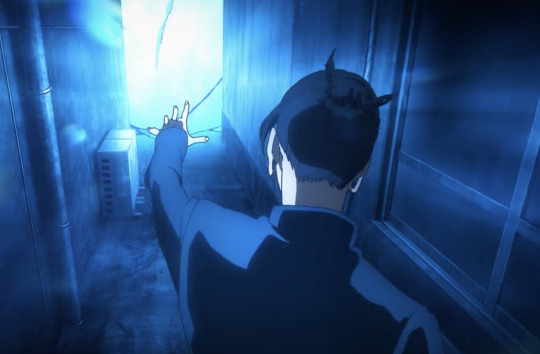
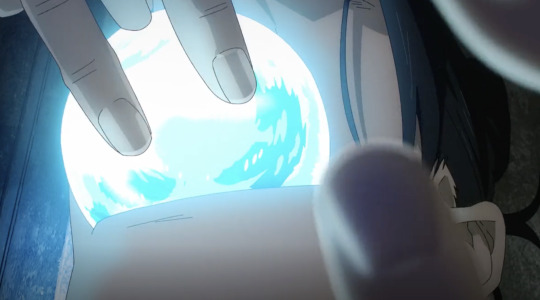
when we're introduced to him in hidden inventory, our first glimpse is of him consuming a curse. he's also alone, in a dark alleyway, a symbolic image that parallels his journey throughout the story. he's a consumptive force, a facet of his being that ultimately leads to his undoing because he consumes the responsibility of "saving" the strong, who are burdened by the weak.


gojo, on the other hand, repels. he's an outward force, extending out a physical barrier that creates distance between his body and the world. where geto invites, gojo rejects. their abilities are constructed as diametrically opposed to one another's.

through the motif of gojo's abilities, this image captures their consume/repel dynamic in a singular shot. after riko's death, gojo leans into red, which repels. he focuses on growing stronger and in doing so, isolates himself from the world (and subsequently, geto). on the other hand, geto leans into blue, which aligns with the consumptive nature of his character. he harbours riko's death inside of himself and it festers, like a curse.

black holes are all-consuming vacuums. they subsume everything around them and create an inescapable vortex— once you're pulled in, you're never getting out. it will literally eat you and in doing so, makes you an everlasting part of it.

white holes, on the other hand, function in opposition to black ones along the same axis. where black holes pull, white holes push. nothing can enter them; they're doomed to a lonely eternity because of the force that holds the universe at a distance. nothing outside of it can affect what goes on within, yet it affects everything around it.
however, white holes can be subsumed by black holes. while nothing can enter them, if a white hole were to cross paths with a black hole, its consumptive force is so powerful that it would eat them too.

after geto and gojo experience a rapture in their relationship, gojo withdraws from the world, holding everyone at a literal and figurative distance. yet, even while he's alone, he's endlessly drawn towards geto. his eyes are bound but his soul isn't— it's tied to the piece of him inside of someone else, and gojo visibly feels the pull.
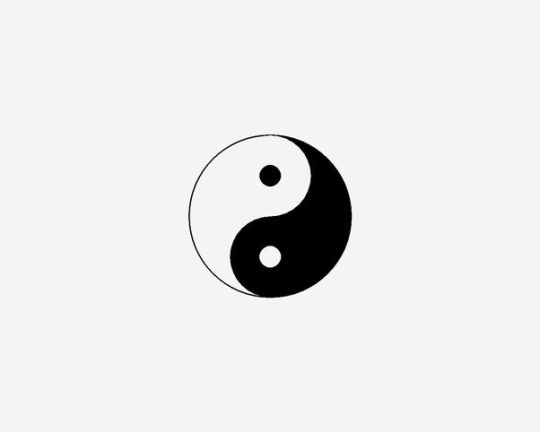
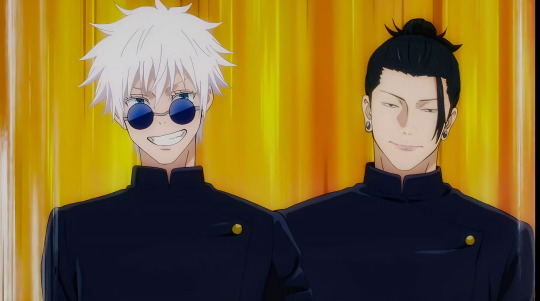
white/black holes also correspond to the colours associated with gojo and geto's characters (they align with their yin/yang dynamic, where yin (black) symbolizes darkness & the moon and yang (white) symbolizes light & the sun).
yin/yang are more than two halves; they form an indivisible whole. they become one another: light turns to dark, the moon replaces the sun in the sky, life transitions into death only to be born as life again.
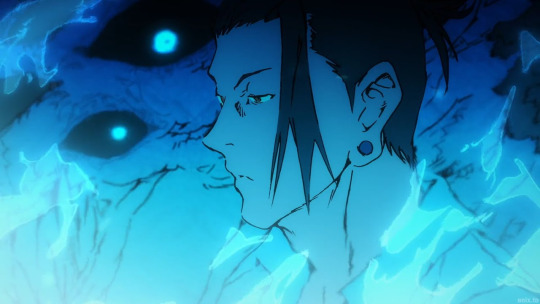
if two celestial bodies exert oppositional forces upon each other, they function in equilibrium. geto's consumption was growing alongside gojo's repelling, reaching an event horizon when he took the lives of 112 villagers and forcing the two of them out of equilibrium. he continued to consume (curses, money, vulnerable people through his cult) until he died and took gojo's soul with him.
consumption can only exist if there's a repellant force pushing back. geto and gojo are not opposites, instead, they each contain the other— every yin has yang within it and vice versa.
they are borne of each other, they are unknowable without the other. they are more than matching; together, they are complete.
#my jjk meta#this is kinda all over the place but hear me out lmfao#jjk meta#jjk#satosugu angst#satosugu analysis#satosugu meta#jjk angst#jjk analysis#gojo and geto#gojo angst#gojo analysis#stsg angst#stsg brainrot#stsg#satosugu#gojo satoru#geto suguru#satoru x suguru#geto#gojo#jujutsu kaisen meta#jujutsu kaisen analysis#jujutsu kaisen angst#jujutsu kaisen#geto angst#geto x gojo#gojo x geto#jjk gojo#jjk geto
2K notes
·
View notes
Text
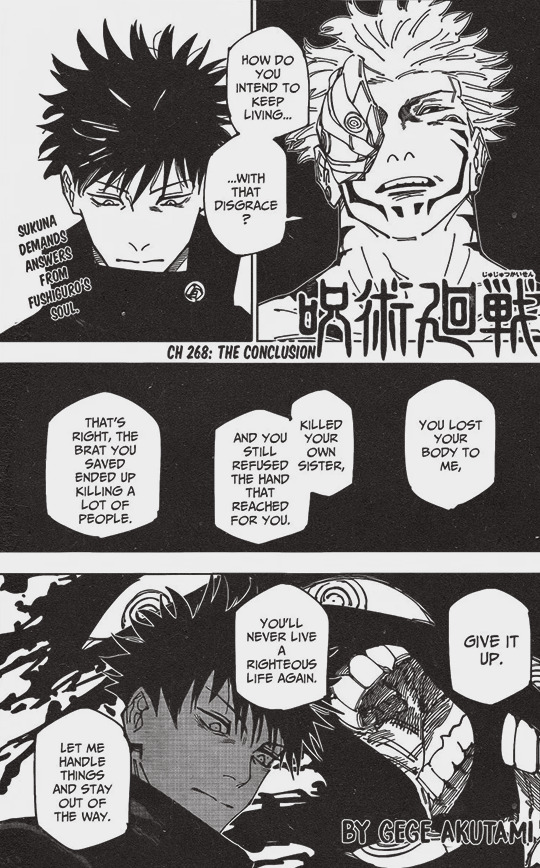
ONCE MORE, I THINK I'LL LIVE FOR OTHERS
So of all the characters in Jujutsu Kaisen Megumi has turned out to be one of the most controversial and hotly debated characters. There's nothing the internet hates more than a boy with trauma, I guess. Jujutsu Kaisen is a controversial work in general so it's not surprising that the ending wasn't super well received by the fans, especially in the way it decided to conclude Megumi's character arc.
There are many people accusing Gege of giving Megumi no character development. Of Megumi just choosing to replace Tsumiki with Yuji. Lots of complaints about Megumi never finishing his domain expansion among other things. Of Megumi being nothing more than a damsel for Yuji to rescue in the end. I'm here to say I think Megumi does have a complete character arc even if it didn't end the way I would have liked, and under the cut I'll be giving my thoughts for Megumi's ending and JJK's ending in general.
I CAN ONLY SAVE THOSE WHO ARE PREPARED TO BE SAVED
If you were to ask me what the most important arc in Jujutsu Kaisen is, it would be Hidden Inventory. Hidden Inventroy covers the inciting incident which leads to all the conflicts in the main story, Riko's death, Geto's defection, Tengen's merger failing, and Gojo's decision to adopt Megumi.
However, it also shows us what motivates Gojo in the main series, mainly his desire to raise this generation of students into strong and intelligent allies because of his inability to save his closest friend when it most counted.

If the quote that summarizes the central theme of Jujutsu Kaisen Zero is "Love is the most twisted curse of them all."
Then I put forward that the quote that summarizes the theme of the main series is what Gojo said to Yaga post Geto's defection, "Being strong isn't enough, I can only save those who are prepared to be saved."
Just like Hidden Inventory is centered around Geto and Gojo's relationship in their youth, the main manga itself centers around Megumi and Itadori's relationship. The manga itself starts with their first meeting. Yuji devours the finger in order to try to help Megumi. Megumi requests Gojo help save Yuji from execution because he didn't want to see another good person die.

Megumi and Itadori are also a deliberate parallel to Geto and Gojo's friendship in the past. To begin with Gojo tried to nurture these relatoinships in his students so they COULD get along and enjoy their youths the way he remembers doing so with Geto in his three springtime of youth.
He not only encourages Megumi to selfishly try to save Yuji even though it is against the rules of sorcery and poses a risk to other people, he also encourages them to socialize at every opportunity.
The strong and intense friendship that Megumi and Yuji enjoy is not only a clear parallel to Geto and Gojo's special connection with one another, but also the fact that a strong reocurring motif in Megumi and Yuji's friendship is their strong desire to save each other. Which is a clear parallel to Gojo's inability to save Geto in the past.
As I said for a long time Yuji and Megumi were being set up as this generation's version of the "strongest duo" except they were going to be able to break the cycle. Whether it be by Megumi saving Yuji, or Yuji saving Megumi, they wouldn't be driven apart by the corruption in the Jujutsu World the way that Geto and Gojo were.
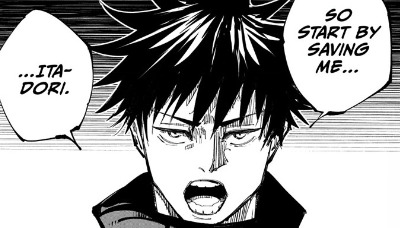
As I said the central question of Jujutsu Kaisen especially in regards to Megumi and Yuji's friendship is if it's possible to save someone who doesn't want to be saved. Which is why Megumi and Yuji both wanting to save each other is something that happens again and again at different parts of the manga. Whether it be the ending of Origin of Obedience where Megumi and Yuji are both unable to talk to each other because they want to try to protect the other from information that might harm them. Megumi hiding the fact that he knows resonance between the Sukuna fingers awakened the curses. Yuji hiding the fact that Megumi's decision to save Yuji has caused strong curses to awaken and kill other people.
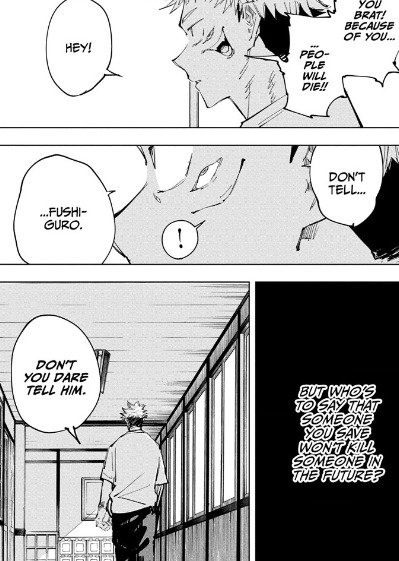
Just as often as these two try to save each other, they fail. Megumi watches Yuji die early on when Yuji takes back control from Sukuna and decides to die without a heart.
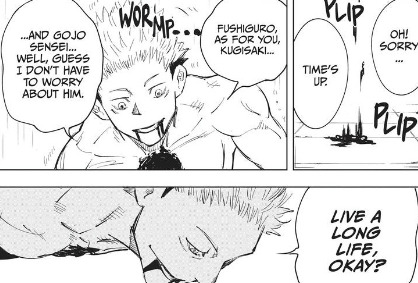
Megumi spends the entirety of the culling games clinging to Yuji's side no matter how Yuji tries to push him away because he knows Sukuna has plans for him. However, Megumi is afraid to leave Yuji alone because he knows Yuji is in a dark place after the Shibuya massacre and that if he's left alone Yuji might just find some way to off himself in a heroic sacrifice to try to atone for the people lost at Shibuya.

Only for Megumi's insistence on clinging to Yuji to backfire because Sukuna ends up taking his body from him in a critical moment. When Sukuna takes his body their circumstances swap and Megumi is the one who's body is being used to kill people by Sukuna. When Megumi has to live with the guilt of Sukuna using his body to kill both his sister and his teacher, he's not able to live with it anymore.
Then their positions swap completely and it's Megumi who wants to die to atone for the guilt, and it's Yuji who doesn't want to let go of Megumi and will do anything to save Megumi from both Sukuna and the other sorcerers even if the right thing to do is just kill both him and Sukuna and letting him live means putting the whole rest of the world at risk.
As you can see not only is saving each other a common theme of Megumi and Yuji's relationship, but at different points of the story both of them are trying to save the other even when the other doesn't value their own life.
Gojo's relationship with Geto is defined by his inability to reach his friend in time, and how he was "left behind" in the end.
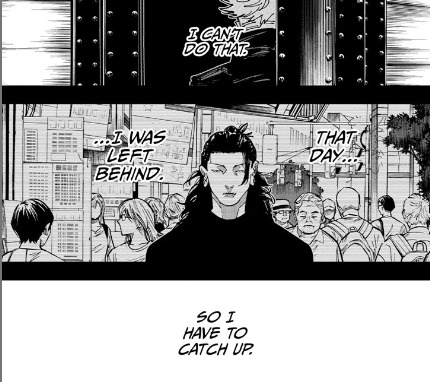
Gojo explicitly waited a year after learning about Megumi being sold to the Zen'in clan to do anything, and only decided to intervene after Geto's defection. Gojo's decision to mentor Megumi was inspired by Geto leaving. He even said "Don't get left behind."
His hope in taking in students like Megumi, Yuta and Yuji was twofold first that he'd be able to handpick and raise several strong students who would eventually replace the elders and reform the Jujutsu World. The second and more personal motivation is that he wanted these students to be able to support each other and be strong allies to one another so they wouldn't end up alone like Gojo did in his youth.

Gojo's intentions were good however, Gojo has a very flawed understanding of how people and relationships work. In Gojo's books "strong=good" and almost everything can be solved by strength. Notice just one chapter ago Gojo said that being strong wasn't enough, he can only save those who are prepared to be saved and yet one chapter later he tells Megumi that he needs to get strong otherwise he'll be left behind.
So, even when Gojo knows that being strong isn't enough and didn't make a difference with Geto, that's still the only real advice he can offer Megumi.
A big theme of Jujutsu Kaisen is the failures of the past generation affecting the present. A lot of people in trying to put Gojo on a pedestal fail to realize one of the central themes of this manga is GOJO WAS WRONG. The way Gojo went about doing several things wasn't the right way. Gojo wants the next generation to succeed him and do better than him, because Gojo himself knows that he was wrong and he's a part of the past generation.
I think a big part of the reason the conclusion to Megumi's character arc is poorly received is that Megumi didn't end his arc the way that Gojo set out for him.
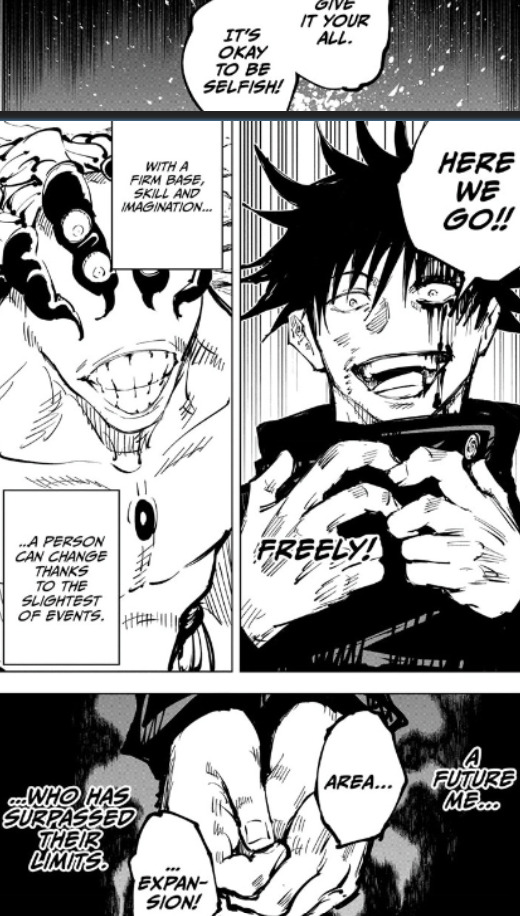
Scenes like this led the audience to believe that Megumi's character arc was going to be completed by him learning to be more selfish and living up to the potential that Gojo saw in him. That we were going to get a completed domain expansion. That Megumi was going to become stronger than Gojo because the ten shadows was the only technique to ever beat a wielder of the limitless and the six eyes.
I understand wanting to see Megumi living for himself, and how cool it might be to see Megumi's complete domain expansion after Gege teased us with this twice but I have to ask this.
If Gojo was the strongest sorcerer in the world, and that still wasn't good enough to save Geto. Then how would Megumi reaching his full potential as a sorcerer in any way help Megumi avoid making the same mistakes that Gojo did?
HAVEN'T WE HAD ENOUGH OF GOJO SATORU
I think a lot of dissatisfaction in Megumi's character development comes from he didn't really follow the path that Gojo set out for him. He didn't unlock his full domain expansion, he didn't learn to live more selfishly. They say that Megumi simply choosing to live for Yuji isn't him learning to stand on his own two feet because he's just hinging his self worth on someone else the same way he did with Tsumiki.
However, I have to ask.
How exactly would Megumi becoming more like Gojo or more like Sukuna be any better?
A big recurring theme in Megumi's arc is his lack of agency, and how many different adult figures have tried to mould him to their own selfish ends.

In the same chapter where Megumi has the flashback where Gojo encourages him to become more selfish, Sukuna has his hands wrapped around Megumi's neck in the colored page. Sukuna was never actually trying to mentor Megumi.
He only had an interest in Megumi because his ten shadows techniques was a way to bypass Gojo's infinity. Henever actually cared about Megumi reaching his full potential. He was grooming Megumi in the long term so he could snatch his body and turn him into a weapon against Gojo Satoru. The same way that Gojo only decided to take Megumi in and mentor him in the first place because his technique meant he had great potential as a sorcerer and a future ally in Gojo's crusade against the elders.
Megumi's life is defined by every adult in his life trying to mould him or use him selfishly for his own gains. His father sold him to the Zen'in clan for gambling money and abandoned him. Gojo only was interested in a strong ally against the elders. Sukuna is just one in a long line of people who are trying to shape Megumi into something he's not for their own selfish desires.
Ngl, the fushiguro girlies are kinda onto something with their characterization of Sukuna’s possession as the physical embodiment of his lifelong struggle for self determination and autonomy and how others have always pupeteered his fate for their own devices and he’s thusly never put himself first ─ his selfishness functioning ultimately as platitudes which still center others and his consideration for them. [SOURCE]
So if all of Megumi's various abusers have tried to make Megumi into something he's not and robbed him of his agency in the process, then is the best ending for Megumi really to become more selfish like Gojo or Sukuna?
If Megumi ended his character arc by using a complete domain expansion, and reaching Gojo's level of power wouldn't that be validating the way Gojo stole Megumi's entire childhood from him in order to make him a strong sorcerer. Wouldn't it look like the narrative was going, yeah, it was wrong for Gojo to groom Megumi like that, but look how strong it made him!
We already have a version of Megumi who learned to live only for himself, someone who broke the chains of fate and became entirely free.
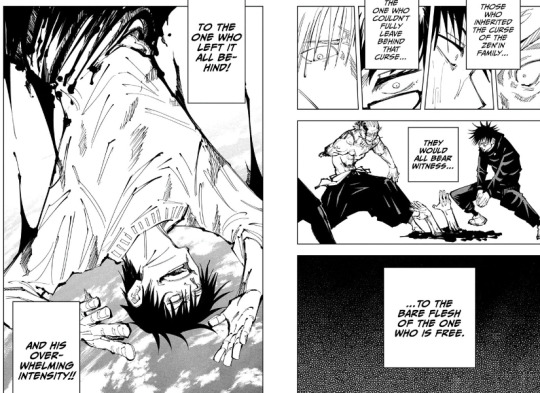
Toji shows us a version of Megumi who lived up to his full potential as a sorcerer, became someone strong enough to threaten Satoru Gojo, and who put himself above everyone else and... Toji's fucking miserable.
Toji is the bad ending of Megumi. He's strong but that's all he is. The narration refers to him as a puppet of carnage, only living to fight the strongest around. In fact, Toji dies BECAUSE he wanted to feel validated as the strongest. The decision to say and fight against Gojo when Gojo unlocks reverse cursed technique leads to his death. Being the strongest and his desire to be validated as someone strong is nothing more than a curse for Toji and what allows him to escape the cycle is not strength, but rather seeing that his son has succesfully escaped the abuse of the Zen'in clan.
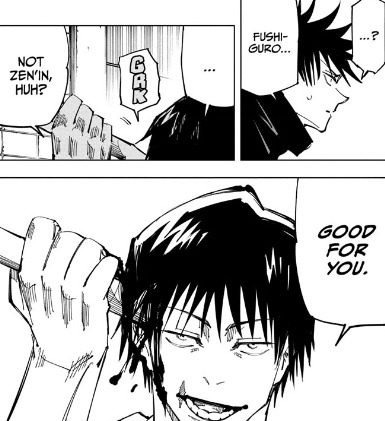
So having Megumi live up to his full potential as a sorcerer, or living selfishly the way that Gojo or Sukuna wanted him to wouldn't really be breaking the cycle, because it'd be Megumi acting the way his abusers wanted him to act. If anything it' be Gojo's long term grooming of Megumi finally succeeding.
I understand that Megumi fighting back on Sukuna from within with one use of ten shadows to create a puddle underneath Sukuna's feet isn't the most dramatic way to signal his journey of self-realization, but sometimes the flashy, dramatic, and satisfying thing isn't always the right thing.
if the central relationship of the series is Megumi and Yuji, and the central question of that relationship was "is it possible to save someone who doesn't want to be saved-" then resolving both Megumi and Yuji's character arcs requires answering that question. That's the most important part. How are we going to break the cycle and have Megumi and Yuji save each other in a way that Geto and Gojo weren't be able to.
Yes, I understand wanting Megumi to be his own person and stand on his own two feet, but before he's a person Megumi is a fictional character. Megumi and Yuji are characters intentionally designed to be each other's other half. The same way that Geto is designed to be the other half of Gojo. They both represent a yin / yang pair. They both represent the shadow and the light, the sun and the moon.
People also talk about wanting Gojo to learn to be his own person outside of Geto, but that's also missing the point. Gojo isn't a person to begin with he's a character designed to be the other half of Geto. All of those parallels that exist between them, both of them getting their bodies stolen from them, both of them becoming monsters (geto slaughtering the village, Gojo slaughtering the elders), both of them dying on the same day. Those are intentional, because they're fictional characters meant to represent the concept of yin and yang and balance. Gojo cannot exist without Geto, Geto's body causes Gojo to get boxed, Gojo dies within a year of killing Geto, because they're meant to represent the taoist concept of BALANCE in a manga that's about BALANCE. Gojo cannot achieve balance with the character that symbolizes his yin. Whereas, Megumi's way of achieving balance is to find a way to make things work with his other half Yuji in a way that Geto and Gojo failed to.
As someone who used to be the biggest Megumi Corruption Arc truther, I've come around in my thinking and I can at least understand why Gege didn't go that direction. Megumi learning to be selfish like Gojo would be changing too much of Megumi's inner nature, because as much as Megumi pretends to be selfish as an excuse he still is someone who wants to help people.
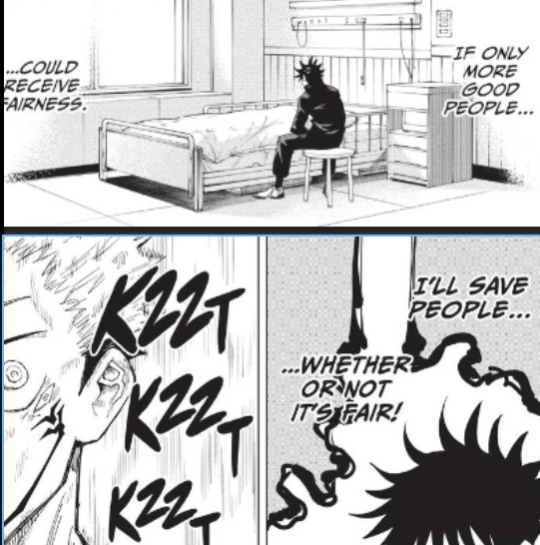
There's nothing wrong with Megumi wanting to help people, or wanting to be a team player. It was Megumi deciding to hinge his entire self worth on just his ability to help one person. It's why he couldn't go on when Tsumiki died, not just because he was grieving his sister, but because he decided to make protecting his sister his entire reason to live and genuinely saw no other reason to keep on living.
A lot of people say that Megumi is just deciding to make Yuji into an emotional crutch the same way he once did with Tsumiki, however, I don't think these lines of dialogue really indicate that.
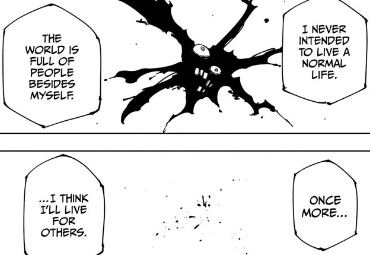
"The world is full of people besides myself. Once more I think I'll live for others."
To begin with, Megumi says that the world is filled with lots of people. Megumi didn't want to go on because he didn't think he'd ever love someone as much as he loved his sister. That there was nothing in the world worth living for if his sister was gone.
However, now Megumi is acknowledging that there are more people in the world than just Tsumiki. That he might come to love them the same way that he loved her. That he shouldn't give up on life just because he lost one person, no matter how important that person was.
Megumi's words run contrary to the idea that he's just going to use Yuji as his next living emotional crutch, because he says the world is full of people. There's more people than just him, there's more people than just Yuji, as long as Megumi makes the choice to continue living then he can go out into the world and meet them.
Jujutsu Kaisen is a very individualist manga, and I understand we also exist in an individualist society so we want to see Megumi stand on his own two feet and live for himself, but I don't think Megumi deciding he'll live for others is a bad thing. This is just a few chapters after Yuji said that what makes life meaningful is the memories you leave behind with other people. Which is the exact same sentiment.
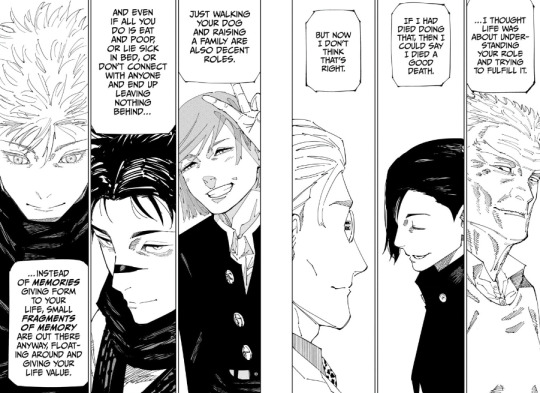
Yuji is able to break free from the cog mindset when he realizes that all the people he connected to in his life gave his life meaning, even if they died tragically, even if he only knew them for a short time. Choso's final words are "Thank you for being my little brother" and that connection was incredibly important even though they only knew each other for about a month. Yuji's life became meaningful because he went out into the world and made all these important connections.
Now Megumi is doing the same thing. He's resolved that even though his sister is dead the world is full of people he can connect with. That he can come to love other people the same way that he did. That his life is still worth living because he can find new people to love. Is Megumi deciding he can try to live for the other people in his life and his connection to those people even after the loss of his sister made him feel like his life is worthless and he'll never love anybody that way again, really that different from Yuji deciding that the people he made connections too gave his life value?
Jujutsu Kaisen lifts from other manga, this is pretty common knowledge. Killua and Shinji Ikari are probably the two biggest inspirations for Megumi and both are two very passive characters who are entirely reactive. They don't decide, they don't act, they react to the decisions of people around him.
Killua's ultimate moment of character development isn't beating his abusive big brother, or his abusive parents in a physical fight after getting a power up. Killua's greatest moment of character development is accepting Nanika as a part of Alluka. Something he was too afraid to do because it would mean that his family would continue to try to exploit Alluka for her wish granting abilities.

Killua finishes his arc with the resolution to protect both Alluka and Nanika from the rest of his family. Considering that Killua has been centering his entire self worth around his usefulness to Gon by this point you could call it Killua is just replacing Alluka with Gon as a crutch if you were cynical. Or you could just say that Killua, like Megumi is someone who lives for their loved ones and finds value in the bonds he makes with other people.
Shinji Ikari spends the entire 26 episode run of Neon Genesis Evangelion not making a single decision, and his final moment of character development isn't really that much character development. He simply makes the decision to reject instrumentality and try again. To go back to the real world and try to be a person in the world again, because as long as you're alive there's still a chance to be happy.

Megumi like Killua, never really changes. It's in Megumi and Killua's nature to be a protector / a nurturer. They want to take care of the loved ones in their lives. Megumi and Shinji both have an arc where it takes the entire anime / manga to take the very first step. Their arc is there to depict how hard it can be to take that first step on the journey to change when you're as traumatized as someone like Shinji or Megumi.
Megumi's arc especially is about him making his very first decision in the whole manga. As I said the central question of Megumi and Yuji's relationship is can you save someone who doesn't want to be saved and Yuji eventually finds you that you can't.

Yuji's greatest moment of character development and empathy for Fushiguro is realizing he can't force savlation on Fushiguro if Megumi doesn't want it. He can't force Megumi to live. He can't just tell Megumi to be stronger.
In doing so Yuji does something that no one has ever done to Megumi in his life, and offered him a choice. Gojo expected Megumi to be as strong as him and saw him as a mini-gojo never once taking his opinion into the matter. As I said above Gojo sees being strong as the soliution to all of life's problems. His adivce to Megumi was don't be weak, otherwise you'll be left behind.
Yuji allows Megumi to be weak. He says that Megumi doesn't have to be strong and suck it all up. The metaphor of Yuji and his grandfather works well to show how Yuji truly understood Megumi in a way Gojo never did. Gojo expected Megumi to be as strong as him. Gojo encouraged Megumi to grow up into another Gojo. Gojo failed to understand Megumi in many ways because he wasn't Gojo, and enjoy Jujutsu and being a sorcerer the way that Gojo did.

Yuji relates the story of his grandfather rejecting chemo treatment. At the time he didn't understand why his father would refuse the treatment just because it was painful, because Yuji being young would have been very easily able to handle the pain. However, after Yuji went through trauma and started dealing with suicidal ideation in the aftermath of Shibuya he understood why some people wouldn't want to keep fighting.
Yuji knows what it's like to be weak and want to give up so he doesn't want to force Megumi to be strong. Gojo projected himself onto Megumi and expected Megumi to always be strong and to love Jujutsu like he did, and didn't understand the ways Megumi was different than him. Yuji on the other hand accepted Megumi for who he was with those words, even though Megumi was weak and didn't want to continue living Yuji didn't crticize him he accepted that Megumi was different from him. He accepted the fact he didn't really understand Megumi's pain. He validated Megumi's pain and didn't try to dismiss it.
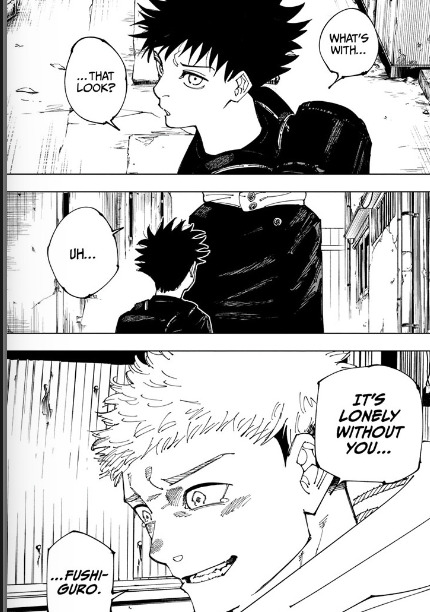
This parallel to Gojo and Megumi's first meeting is so important, because Gojo showed up in that child's life only to exploit him. While Yuji gave Megumi a choice. Even if it meant that Yuji would be lonely and heartbroken, he still gave Megumi a choice on whether or not he wanted to live.
In the end Yuji gave Megumi a choice, and Megumi made that choice to keep living. Just like Shinji, Megumi's entire character arc was just leading him up to taking the first step on his journey. Just like Shinji, Megumi's entire arc is defined by his choices being taken away from him but the very first choice he makes is his most important one: the choice to live.
So yes, a Megumi corruption arc would have been really cool but I think the answer of "You can't save someone who doesn't want to be saved, but you can still love them" is a beautiful one.
#jjk meta#megumi fushiguro#yuji itadori#itafushi#satoru gojo#suguru geto#satosugu#ryomen sukuna#jujutsu kaisen spoilers#jjk 271#jujutsu kaisen 271#jujutsu kaisen#jujutsu kaisen meta
409 notes
·
View notes
Text
Gojo cares a lot, actually
Perspective and empathy in Jujutsu Kaisen
Once again, I see accusations that Gojo only cared about people in relation to their strength. I can't believe that 236 and 261 haven't put this idea to bed already, but let's go over it again for the class. Here are some thoughts on the importance of perspective and empathy in JJK. Spoilers for chapter 266 ahead!
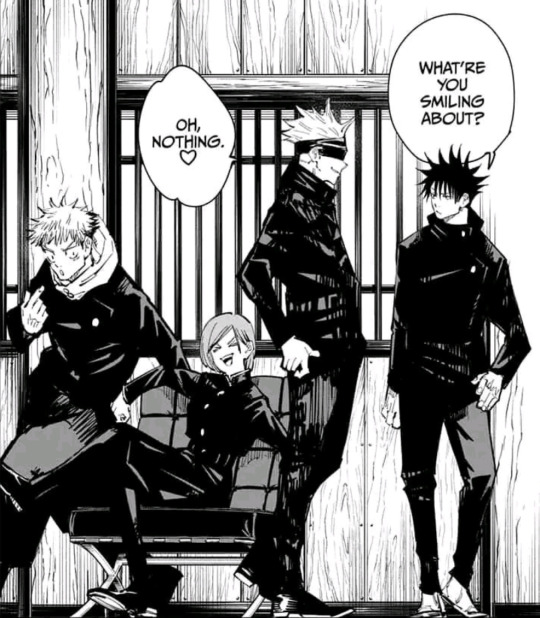
In 236, Gojo tells Geto he loves everyone. This single line, direct from the man's mouth, should be enough. However, moments later, Nanami says, "You never cared about protecting people". So why do some readers only take one of these perspectives at face value?
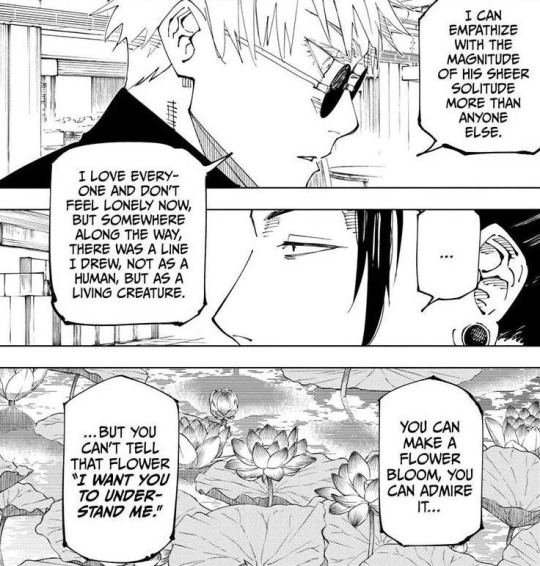
Perspective matters in JJK. Often, characters and even the narrator state things that are only true from their perspective in a given moment. What you choose to believe says more about you than it does about them — an idea I explored in my analysis of 236.
This is particularly important when it comes to Gojo and Megumi, because the moment they meet is the only (?) scene in the whole of JJK that we get to see from two perspectives.
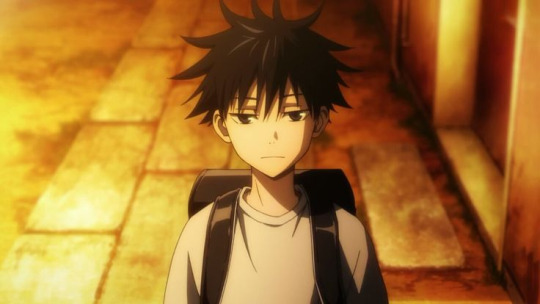

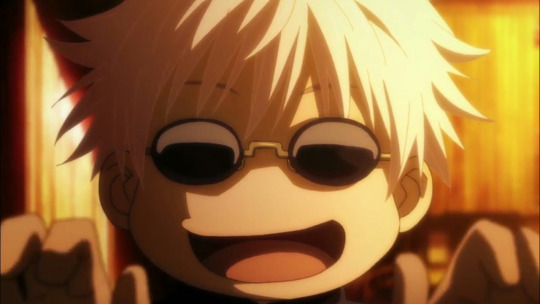
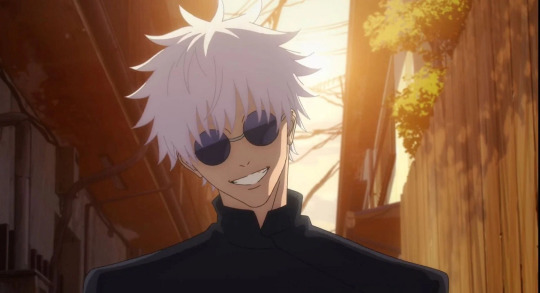
The second time, the reader understands the emotional weight of it for Gojo — but Megumi doesn't. He's kept in the dark, so of course he thinks about their meeting in different terms.
Once again, whose perspective are we going to take at face value? From Megumi's point of view, he wasn't offered a choice. From Gojo's point of view, he extended to a child the little agency available to him.
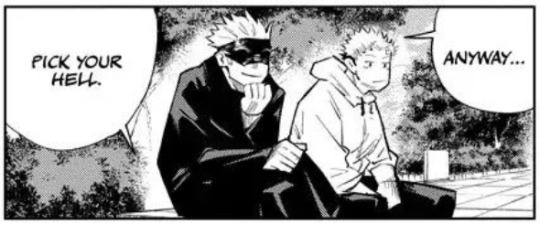
Offering a choice is something Gojo does consistently throughout JJK — pick your hell. It's one of the ways he shows care for others that goes unrecognised, so it's ironic that readers and characters alike misinterpret it for a lack of empathy. However, this is no coincidence.
For much of the series, Gege keeps Gojo at a narrative distance from the reader. Most of what we know about Gojo comes from what other characters tell us, and our view of him is therefore coloured by their perspective.
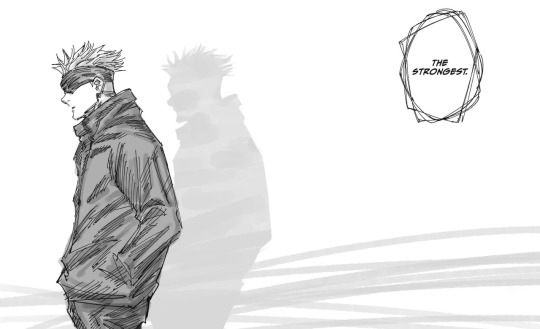
However, while Gojo laments the distance between himself and others, he fails to recognise that he's the one maintaining it — and not because of his strength or his technique. He has admirable goals, but he chooses to work towards them alone.
There are many occasions where characters reach for Gojo, but he refuses to let them past his metaphorical Infinity out of a sense of duty and perhaps misplaced belief that he alone can or should bear this heavy burden.
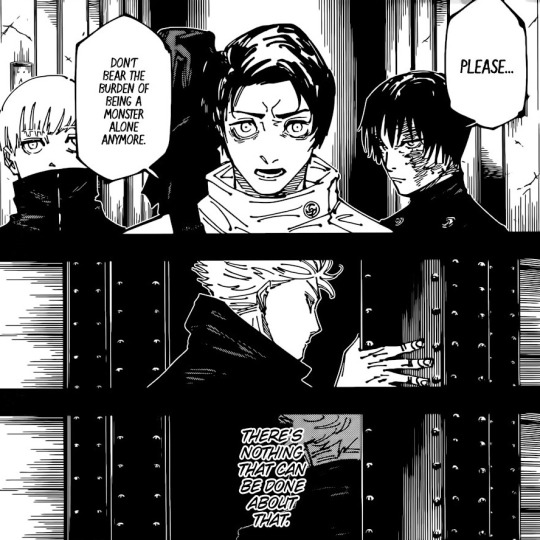
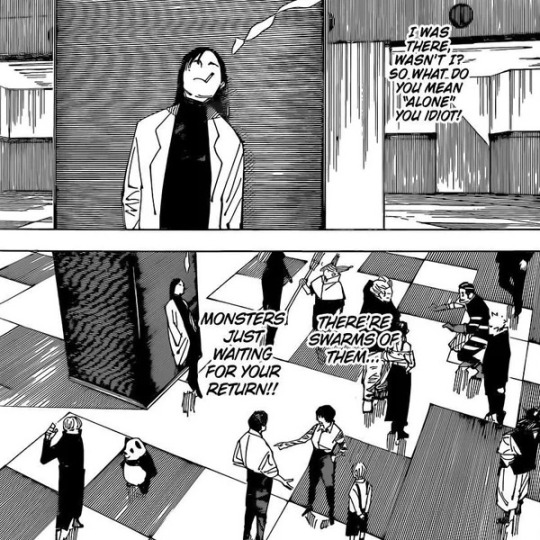
All of Gojo's actions are about preserving the humanity of others at the expense of his own. That's precisely why he chooses to become the "monster" alone. In this way, Gojo is flawed but he isn't uncaring. Again, it's a matter of perspective.
Gojo sees strength as the solution because it's all he's ever known. However, recognising the strength of others doesn't mean that's all he sees — because Gojo knows that dehumanisation acutely. What's more, 261 also suggests he thinks of "strength" in different terms to others.
When they meet, Gojo tells Megumi not to get left behind. However, he later says he was "left behind" when Geto defected. We know Gojo's physical strength eclipsed Geto's, yet Gojo only refers to himself as "the strongest" alone after Geto dies.
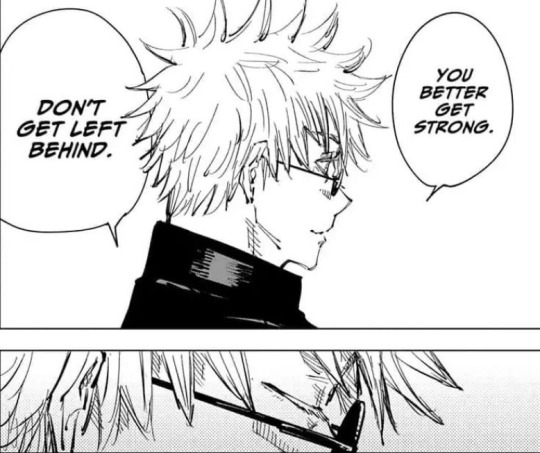
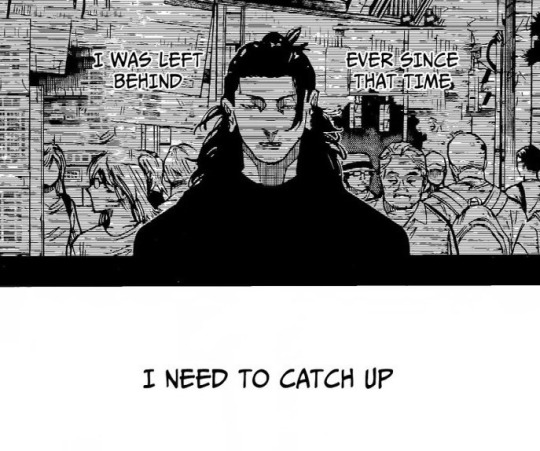
Before that point, there's nothing in the text to suggest that Gojo ever stopped thinking of the pair of them as "the strongest" — as a unit, as a duo. This suggests that strength, for Gojo, is something much more intangible, much more sympathetic, and much more human too.
What do the strongest characters in JJK all have in common? Indomitable will, courage in their convictions, an overwhelming sense of self. Looking at strength through this lens shines a new light on Gojo's goal of raising "strong" allies.
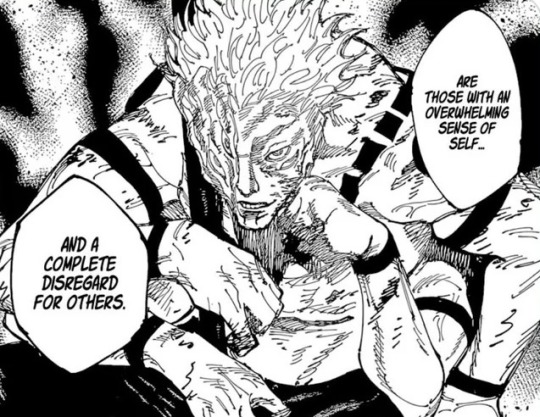
When he forces a third option in Shibuya, Gojo proves that strength doesn't have to come at the expense of compassion. In the later chapters of the Shinjuku Showdown arc, Yuta, Yuji, and the rest of Gojo's allies reinforce that idea ten times over, and I have every belief that Megumi will soon do the same.
To suggest Gojo only saved Megumi for his technique is unfair when he has consistently proven himself committed to protecting the futures of others, even "weak" non-sorcerers who have nothing to offer him. Once again, it's all a matter of perspective.
Gojo's way of caring is still caring, even if it doesn't look familiar to you. His only flaw was closing himself off from others and choosing to care from afar. However, just like Gojo never stopped reaching for Geto after he left, Gojo's allies never stopped reaching for him.
There's a phrase we use to describe looking at things from another perspective: putting yourself in someone else's shoes. I think it's very telling that Gojo's allies have taken that literally — Yuta by stepping into his skin, and Yuji by standing in his place in 266.
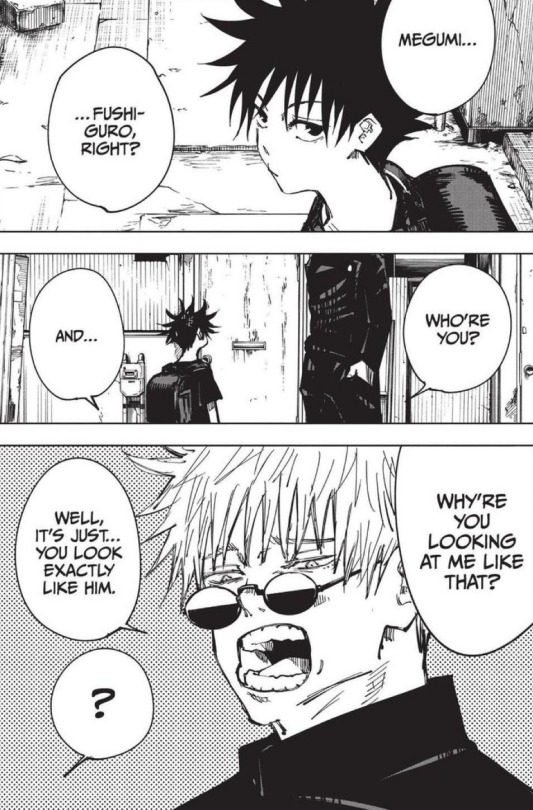
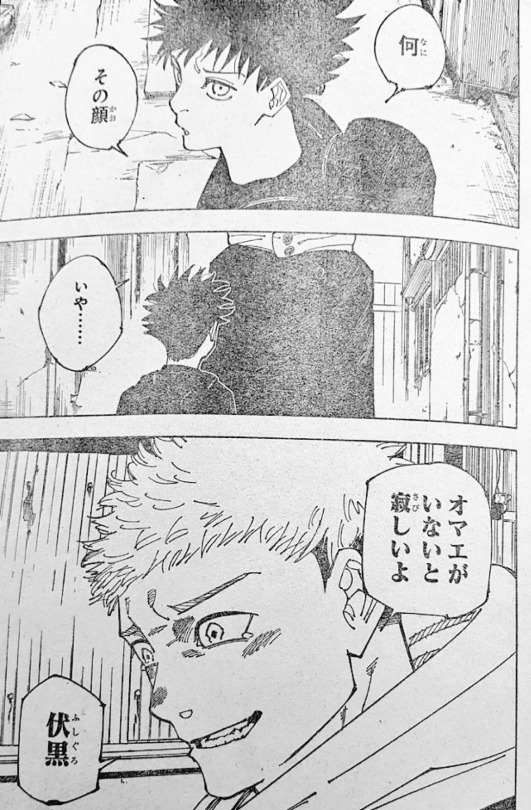
TL;DR: Gojo cares a lot, actually. If Gojo talking about his innermost feelings can't make you empathise, and the students he supposedly "doesn't care about" recognising his burdens can't make you empathise?
Well, that says far more about you than it does about him.
Come read my fics about this!
In His Shadow explores the ways Gojo keeps his distance from Megumi, who isn't equipped with the tools he needs to reach him but finds his own ways to show he cares, born from ten years of history together.
Rivers Crossed, Mountains Scaled explores Gojo and Megumi's relationship through the vehicle of SatoSugu — why Gojo took him in, whether Gojo really gave him a choice, how Gojo sees him.
Hope you enjoyed the post! I love you, Gege Akutami ♥️
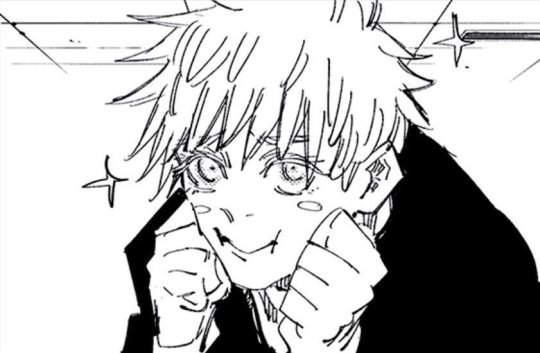
#jujutsu kaisen#jjk#jjk 266#呪術廻戦#gojo satoru#fushiguro megumi#jjk spoilers#jjk manga spoilers#jujutsu kaisen spoilers#jjk meta#jjk analysis#jujutsu kaisen meta#jujutsu kaisen analysis#glo's writing#glo's analysis#fushiglow
555 notes
·
View notes
Text
The man surrounded by the theme of love…
Geto.
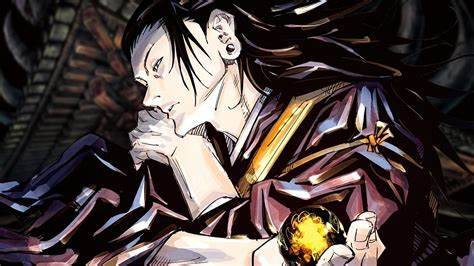
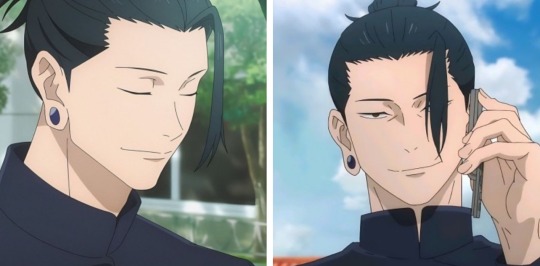
Gege has made several writing choices to depict Geto as someone who was handsome and loved - arguably more than any other character in the series. Maybe Gege loves him the most - not complaining at all.
More under the cut - just a few visuals I’ve collected to demonstrate this. I’m certainly not alone in noticing it and there may be others who show this much better, lol. Tag me in if you want to share!!
My post does end with a not-so brief analysis which you can skip if you wish.
Geto, despite being cursed at birth with the technique to absorb the ills of the world, the very skill that led him to fight alongside Gojo as part of the Strongest Duo - by design, each others’ counterpart in so many ways - a twist of fate led them onto opposite paths, leading to complete imbalance, one that drove him into madness.
If Geto in some ways represented Love, it is truly the most twisted curse of all which played a part in his death.
Geto witnessed the most love confessions in the whole series - I found (and stole) it off twitter/now X:
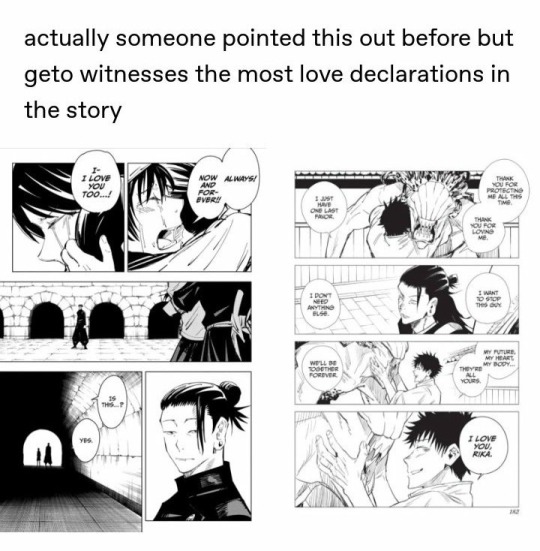
The Japanese originals seem more compelling to me:
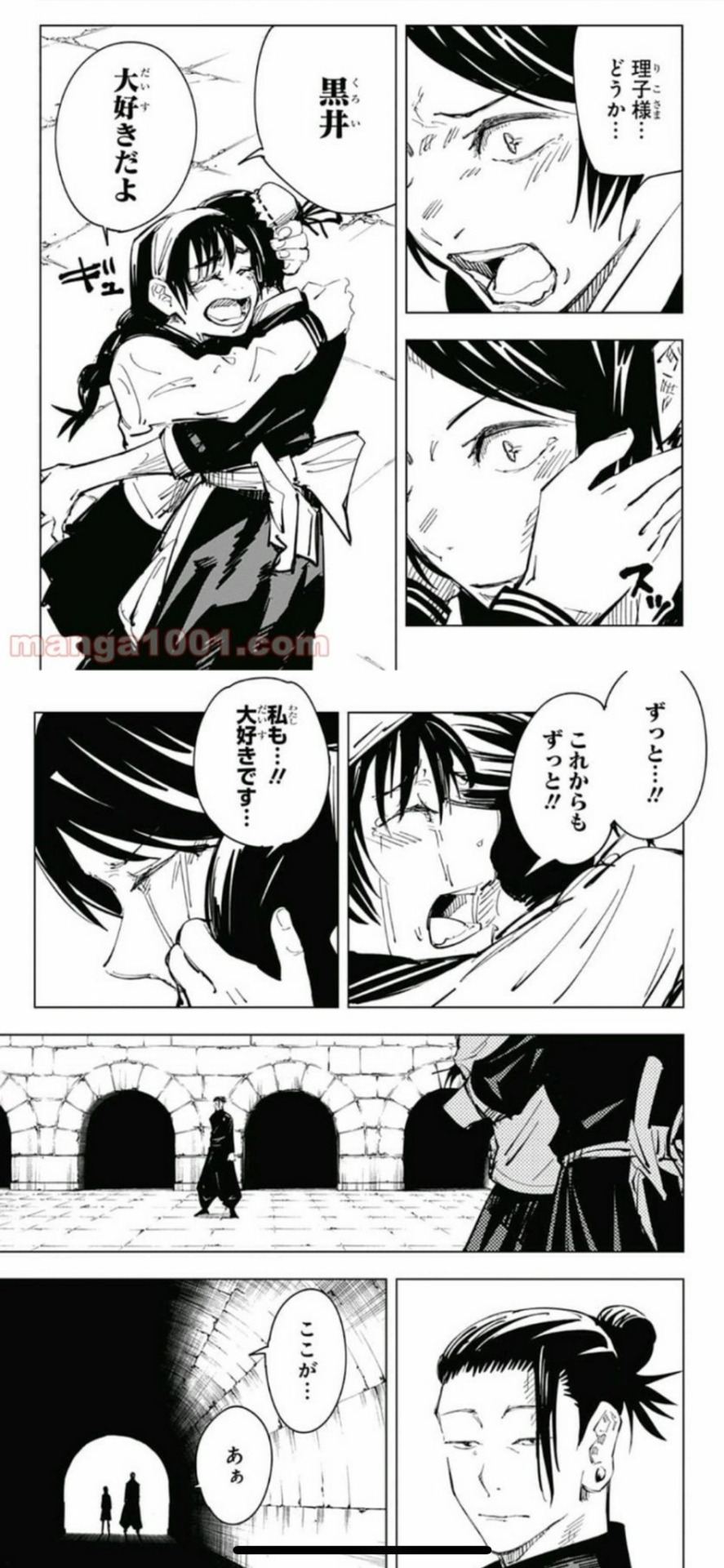
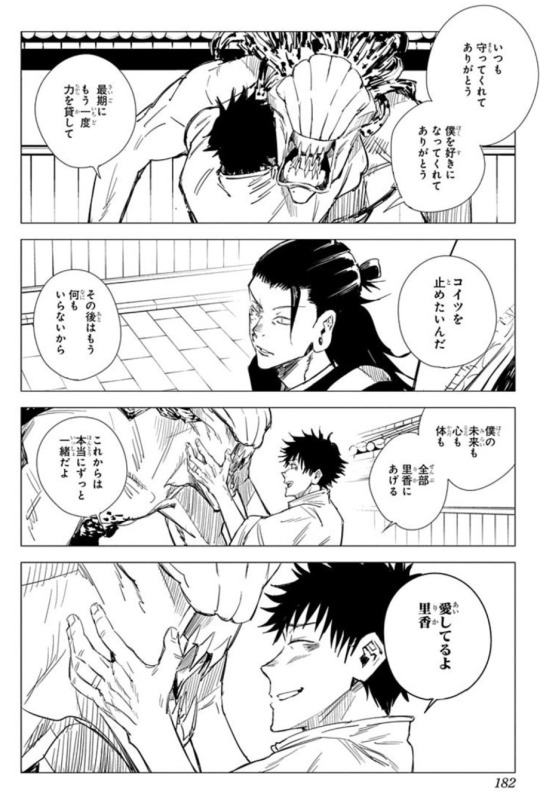
Riko says “daisuki” whereas Yuta uses a more traditional “Aishiteru” which, is quite embarrassing of a confession, and therefore almost hints at what could be Gojo’s last words to Geto, if it directly parallels Yuta & Rika’s relationship. And that expression Geto wears when he sees Riko and Kuroi struggle with separating?
That does not look like a person who cannot sympathise and empathise with people. Geto was a person who cared too much, and in search for a way to protect those he cared for, needed an outlet and something (in this case, lesser being, the humans) to blame. He descended into a mania and much like shinobu sensui from yu yu hakusho, seemed to develop some kind of mental disorder due to being unable to carry the conflicting ideals together. The dissonance the world presented to him was just too cruel, and he himself became a weapon to defend his ideals.
Before his defection, Geto was liked by his peers:
Haibara
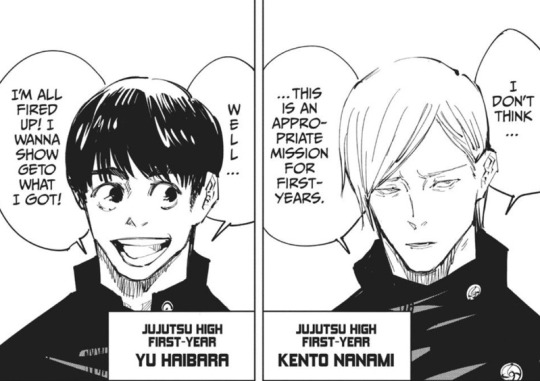
Mei Mei
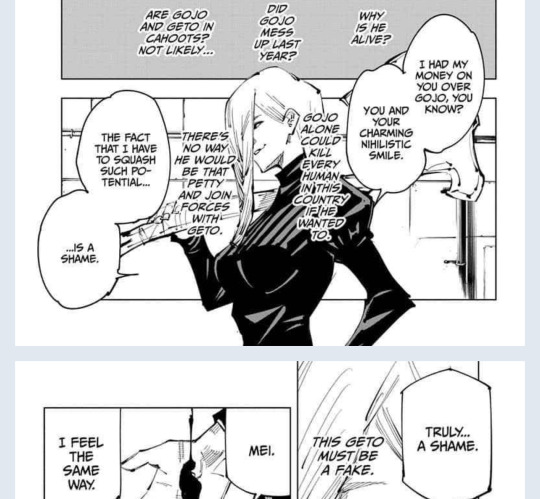
Loved by his family for and despite his ideals:
Mimiko and Nanako
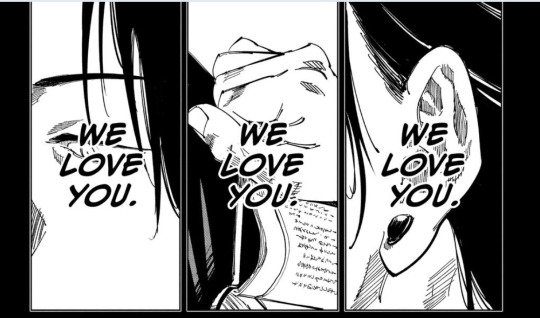
Shibuya crew liked/loved him and carried his will/beliefs even after his death, in their own ways, as family:
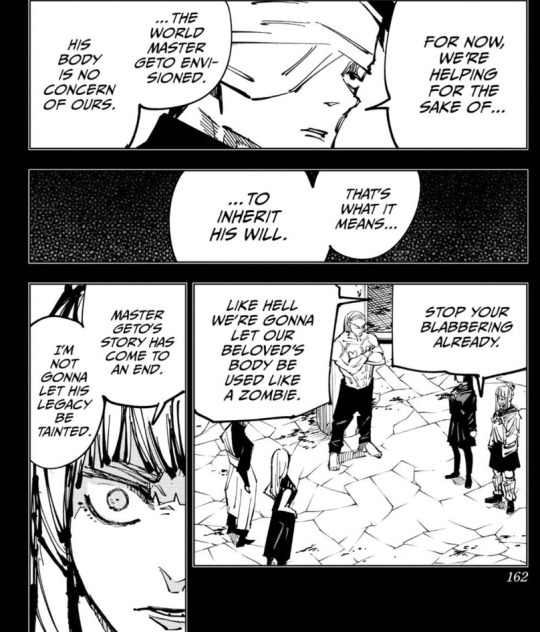
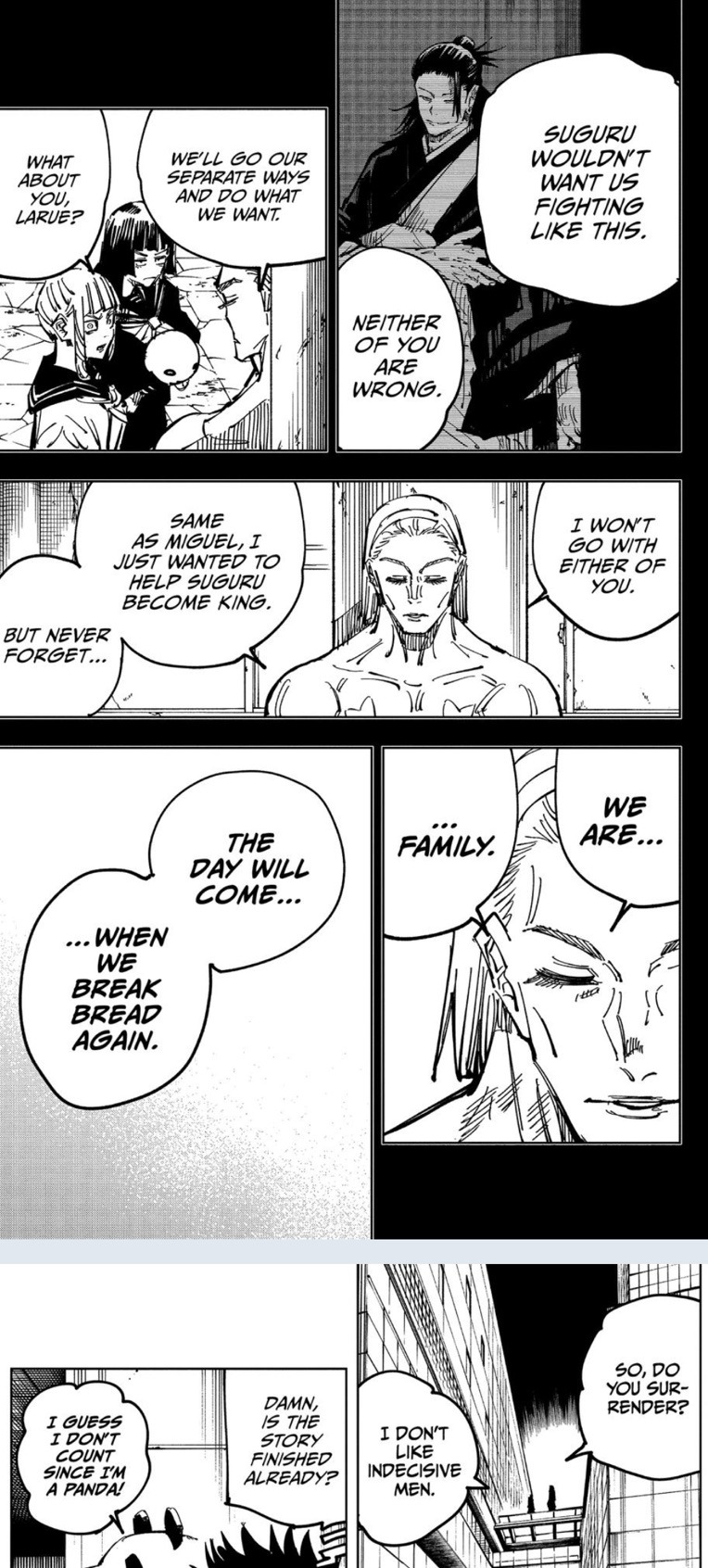
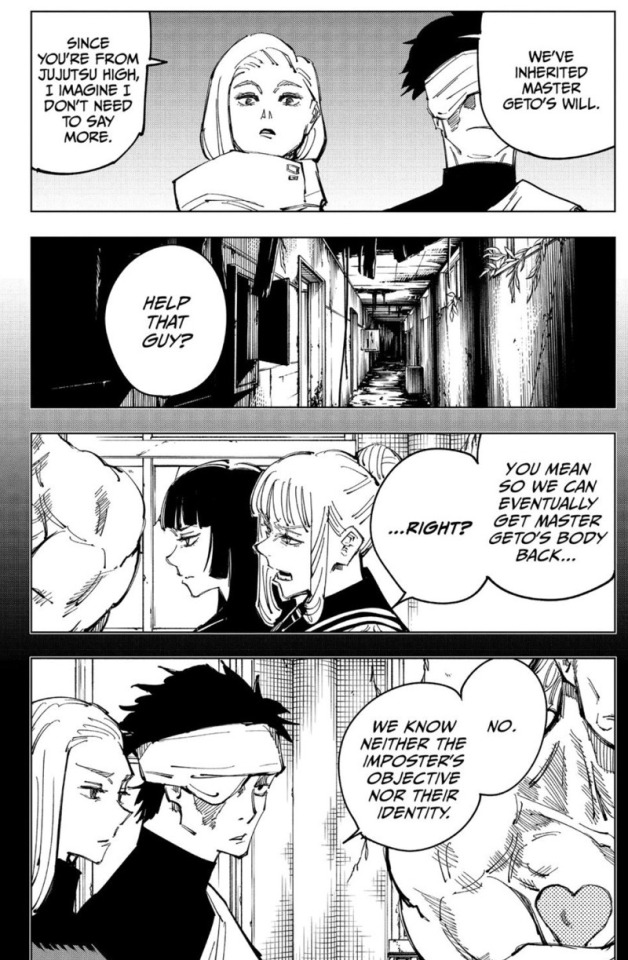
Miguel and Larue in the most recent chapter to date:
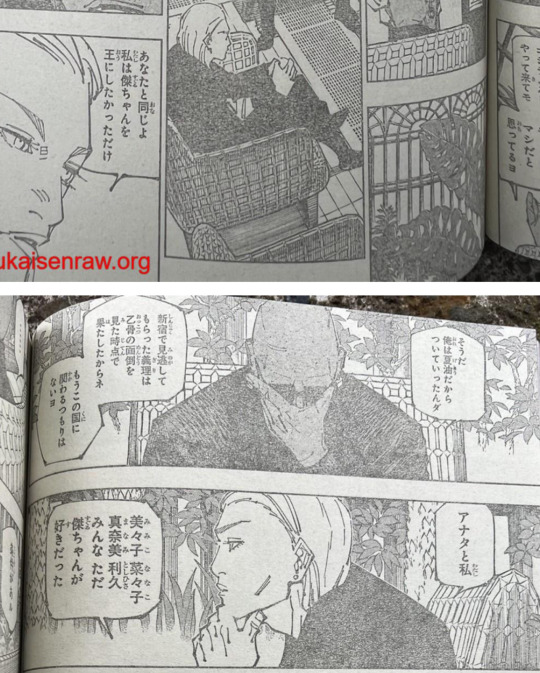
Translations (rough):
Larue: You and me alike, we just wanted Suguru-chan to be King.
Miguel: Yea, I followed just because it was Geto. After shibuya, I trained Okkotsu and I don’t want anything to do with the country anymore. (Something along these lines; a little too complicated for my rudimentary Japanese)
Larue: You , me, Mimiko, Nanako, Manami, Toshihisa, everyone just really liked/loved Suguru-chan.
Canonically, he was known to be handsome and popular:
Takaba
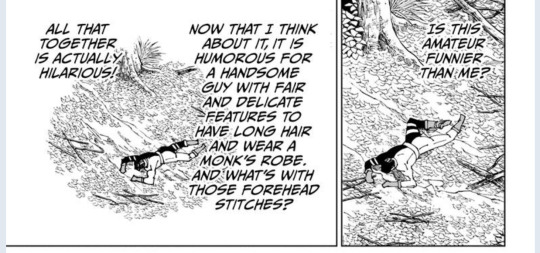
Gege’s character book:
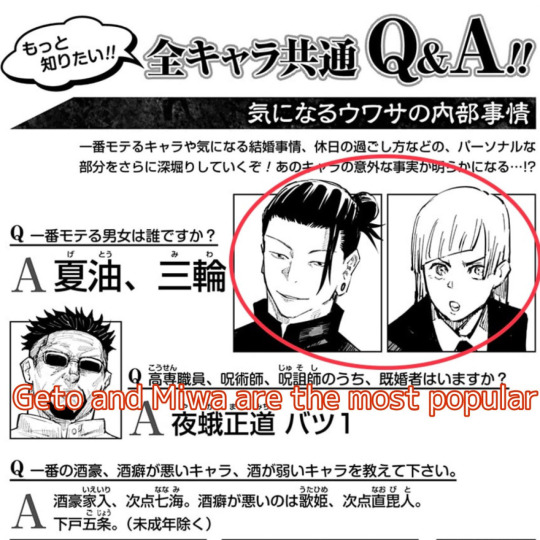
JJK popularity poll:
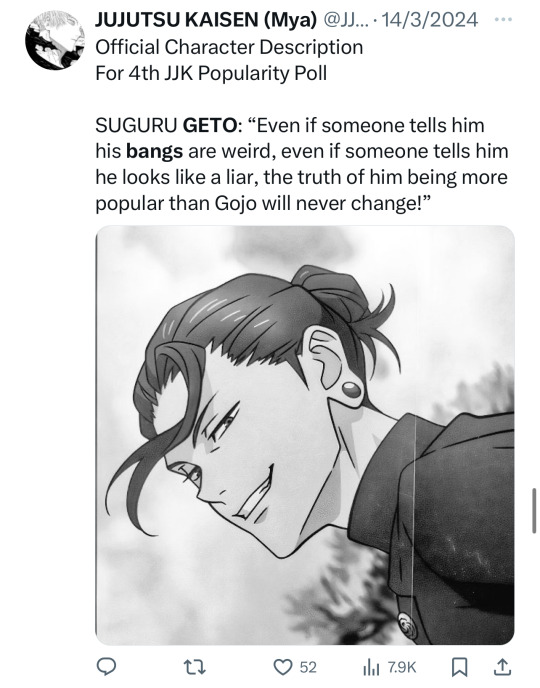
I do not have screengrabs of how Manami and Larue joined, but it was said to be due to how handsome they thought he was.
Maybe he was like Rika, who did realise how she came across in her life, and manipulated people, lol. But that’s a bit of a stretch to bring that parallel/similarity in. Geto was just quite a magnetic person, according to Gege.
And in the most roundabout way:
Gojo:
“my one and only”
“Love is the most twisted curse...” “curse me a little at the end.”

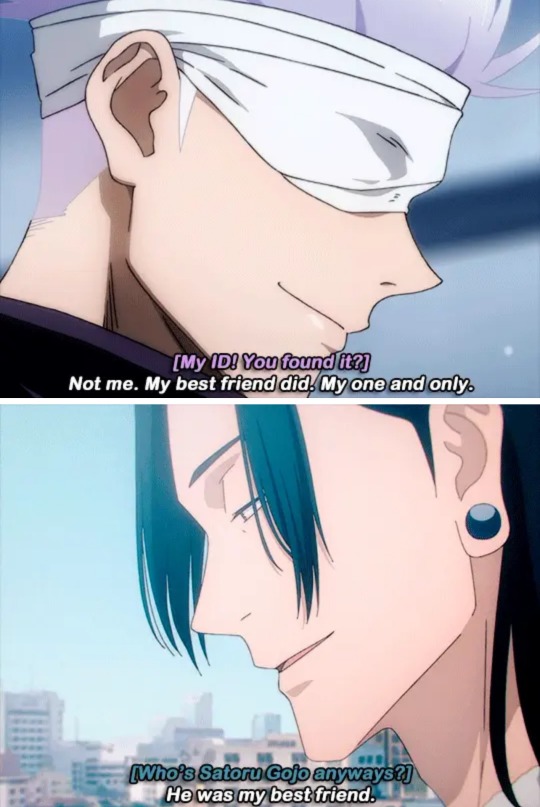
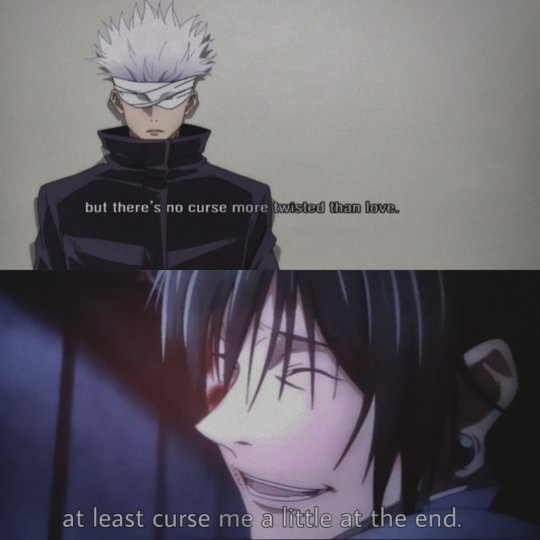
“I don’t need love to satisfy me” ... “if you were there I might’ve have been satisfied”
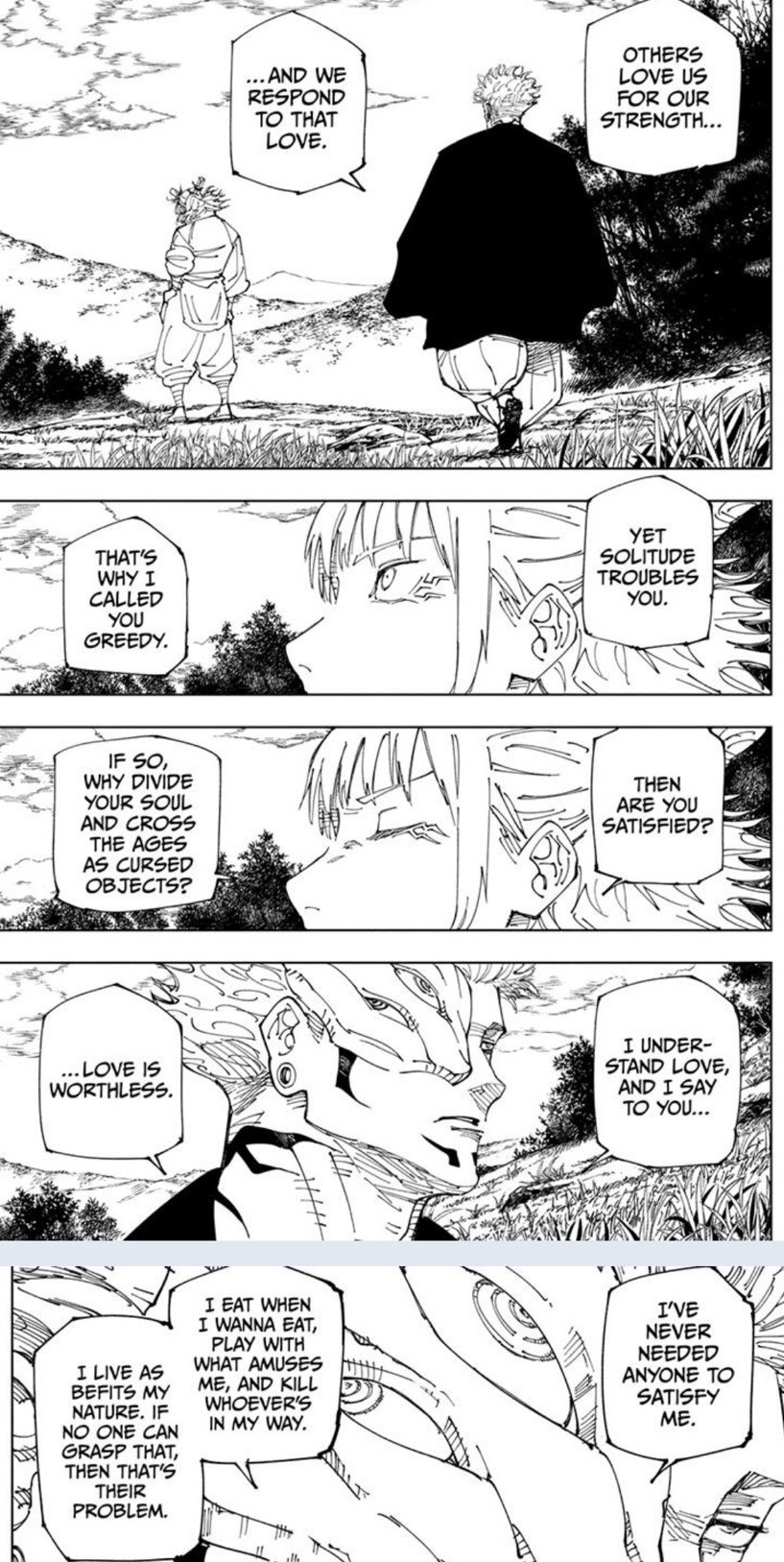
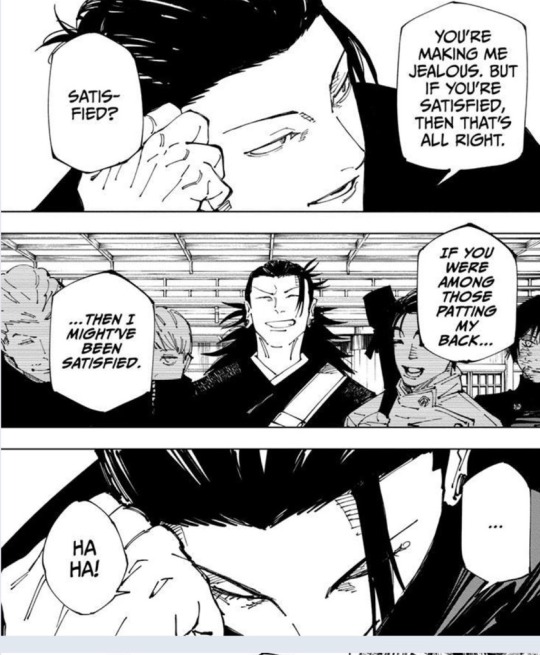
While love surrounds Geto, the theme that follows Gojo appears to be “the strongest” cursed; he was admired, revered, feared, and disliked by many. It truly breaks my heart, to think of what he had to give up to carry the weight of this for his whole life, until the very end.
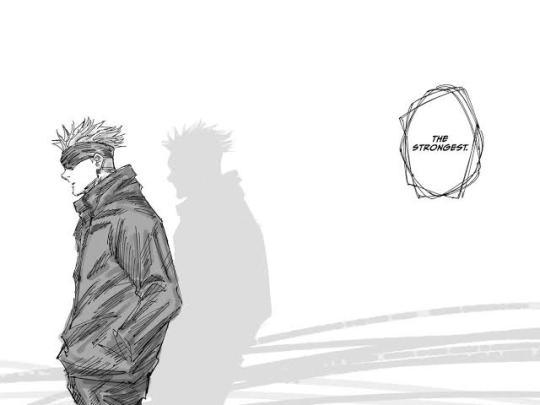
This looks like the most dizzyingly lonely picture of Gojo. It was indeed ironic to have it all but to embody what it means to have an unlimited void by being totally different.
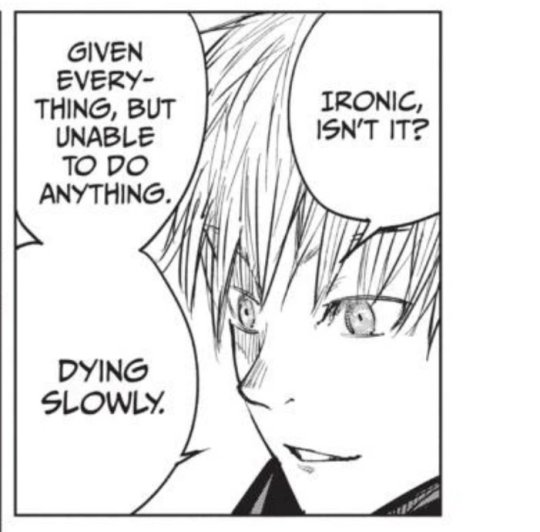
He suffered so much for his power and to have carried this strength. The sorcerer world was practically on his shoulders. The balance was up to him; everyone relied on him. Every time he tried to protect his love (geto) it seemed to fail. It worsened each time, ending with his own demise. But of course that’s just a dramatic interpretation - I don’t really mean/believe that, but it is one way to see the tragedy between Gojo and Geto. Strength at the expense of love; it plays out with the strongest this far as those identifying with this title are plagued by loneliness and do not know love.
They met before things got twisted within themselves, between them. Even after Geto left, Gojo seemed to be looking and waiting for him - to prove his trust for him almost as if he saw through his illusions and lies. Geto was the shadow (Yin) and Gojo was the light (Yang). Only the light can see through the dark. I’ll leave the gojo characterisation for another time / to other better writers.
For now, I’ll just say that I felt that he had planned for the possibility of losing to Sukuna (with the various things we see him do between scheduling the 24th and the actual day) and if he won, he’d just carry on the plan to cremate Geto on top of saving everyone and being a good example as the strongest. Worst case scenario, he would weaken Sukuna and I guess just die on the same day as Geto - idk, maybe as a form of redemption for one of his most painful experiences in life. Who knows?
I headcanon he was relieved to pass on, doing his part to defend the world that relied on him so much, with a big bang - a really fun fight.
And I’m glad they found each other at the end - the loved and the lost.
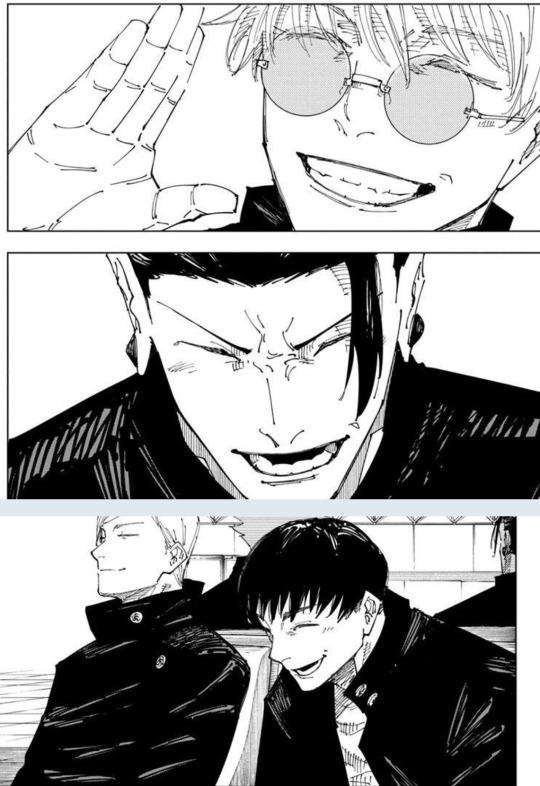
Back to Geto:
We don’t get much insight into what Geto wanted or felt aside from a world that was better for sorcerers, those he cared about. Even at the afterlife scene, or in subsequent chapters, we only hear from others rather than Geto.
Call me biased and delusional; I believe he didn’t kill the innocent despite saying he hated them all. He loved and hurt so strongly that he hated with almost equal force. He did want to force evolution and eventually extinguish all human kind, to him: the ignorant source of suffering, but I’m glad he didn’t manage to get Rika. I headcanon that he was aware he was losing himself by defying his own principles (to kill sorcerers) for his own gain. That, and Rika with a binding vow for a life, no less, was just too powerful.
In the official character book, Geto was described as someone who told himself that he hated humans a lot, like a reminder. He didn’t kill people indiscriminately. I’m sure he was well aware of how evil he had become but he had chosen, hadn’t he? He expressed to Yuta, that self-affirmation was incredibly important in his view. And the more he interacted with the students, I think the more his humanity fought back - I mean, he was standing there crying from being so moved by what he saw. He also let Yuta heal his friends. How villainous? Or how incredibly loving in spite of himself?
Geto has been shown to lie to others too: jjk 0: described having lied to the school about the conditions for obtaining a cursed spirit, and after defecting: upon taking stage for the first time, stating that the looking the part (wearing gojokesa) was important (ie lying). At his death’s door, he also prefaces with, no matter what anyone says - why would there be a need for that if he wasn’t telling a half-truth? He sought to avenge Riko (first person at the cult he killed after calling him onto the stage + cue mic throw) and the village represented a bunch of people who he slaughtered out of rage and ignorance. I’m definitely not defending him here - his actions are reprehensible. My headcanon view is that he didn’t know how to live with himself after snapping and that was the only path laid before him, which he ardently committed to.
I just think that he held onto a form of love/humanity still- Gojo and Geto both did. Without it, Geto would’ve become the Queen of curses due to Rika (uncaring about his family, or killing young sorcerors despite witnessing the students’ bond and yuta’s selfless power of love in jjk0) and Gojo may have focused on training at all cost without embracing Geto’s principles and becoming a teacher to change the jujutsu world - he could’ve become the next Sukuna and take the title of the King of curses instead - crowning them both King and Queen - instead of both the King and Queen contributing to their deaths. Anyway, I digress...
Geto appears very mother-coded in his protective and defensive relations to the girls, but also to Riko, Kuroi, and Gojo - especially after Toji had killed them. He was so fiercely trying to avenge and defend them, but failing that had a huge effect on him. Moreover, Haibara - innocent, glowingly positive - suffered an undeserved death. It weighed so heavily on Geto, that he didn’t defend Gojo when Nanami vented about leaving things to Gojo who seemed to take it all in his stride, almost insinuating that Geto, too, had little autonomy but to carry on that cycle of curse consumption he began to loathe.
Yuki also underlined the meaninglessness of the death / sacrifice / relationship rupture / suffering. And like the novel implies: Geto was too sincere for this world. He just loved too deeply and wounds cut him too painfully. At just 17... what inner resources were they forced to develop?
He was disillusioned by the system, but respected that Gojo had a place there. This is also SatoSugu indulgent: He never once attempted to talk Gojo into joining him, despite it being the most logical choice, but Geto was the emotional and loving kind - he prioritised Gojo over his ideals / himself. This man was willing to die trying to pursue his ideals, but didn’t want to try convincing his friend even if he know it might fail. What does that say about him? I think it says he loved Gojo. And Gojo loved him.
He masked like Gojo did : the infamous “yeah I’d win” and Geto’s “I’ve made my choice” and his face fell as he had his back turned, stating that he just needed to do it to the best of his ability. This may be headcanon but it does seem plausible to me. He was under no illusions about what he had done. To love was to turn away too. To love was to let the other go. Sigh.
Backtracking a bit: When Geto encountered the twin girls, who knows what entered his mind, but there was something that emerged from being horrified, enraged, and it gave birth to new meaning. He would take control and save them - from humans and the institution that made child sorcerors die. According to Gege, he became Papa Geto. (Kenjaku is also mum-coded but the antithesis of motherly love, with the womb protrusion domain and actually bearing children.)
This is of course not limited to feminine energy, as parents, both male and female, have protective instincts. But I’m not here to go into that discourse. Just stereotypically, and loosely speaking, Geto is very Yin energy. He is a big Mama Bear. With extreme maternal aggression. We see female counterparts do this in the wild more than males. And yes, of course both male and female are protective. Both geto and gojo were protective in their own unique ways. That’s for another post. Geto would rather die than have anyone come save him. In fact, the scripture behind him in the temple goes somewhere along the lines of “death to the weak”. If he had failed, he deserved to die. His family should live.
Gojo cares for others differently. And yes we know he died whilst defending others too. He is inherently more individualistic due to what he is with his gifts and noble heritage. He is less emotional and more cerebral, the only time we saw him lose his composure was due to Geto.
He allows his students to take risks and would allow them to fight in his stead, like in jjk 0 where Toge and panda were sent to be defeated by Geto. Tough love, as Gojo admits. This is also very Dad-like in the modern sense of the word.
In my subjective experiencing of the world, it’s almost like a husband who is only really emotionally vulnerable with his wife, and is otherwise the successful businessman, dad, and whatever else he is. Geto is much like a mum that he would walk away from her husband (lol, Gojo in this case) in order to protect them in a way she deems is best. Maybe I’m a little nuts, I don’t know. (Actually I am a little eccentric, but that’s by the by).
Now this is totally just satosugu indulgent: I headcanon that Gojo also “protected” / was possessive of Geto by making a deal with Miguel since the latter said he would curse Geto if he died, lol. Especially in light of the latest chapter where Miguel said he was spared by Gojo. (And i reckon Gojo was respectful of Miguel being Geto’s family, so he spared him for that reason too). I mean, Gojo had to kill his best friend, but this was his burden to bear, you know? It’s almost sickeningly intimate to allow someone to end your suffering, and be entrusted with that too. Ugh, ouch, my heart…..
Edit: I’m reminded of that scene where Shoko reflects on loving neither of them, like Gojo, Geto didn’t want anyone to be alone anymore either. Geto said he didn’t feel happy from the bottom of his heart. Gojo felt lonely (although he said it got better at the airport scene). They weren’t alone, but probably felt it… because of the absence of their true/first love? Larue stating in the panels above that Geto wouldn’t wish for them to fight seems like a nod to what Geto believed happened between him and Gojo. Gojo raised allies - be strong, don’t be left behind. Geto a family - get along, don’t fight. Just pointing out what my take is on the parallels I’ve observed.
That ends the brief analysis portion of what I wished to convey about what appears to surround Geto. He may not have been depicted much in the series, but his presence has been felt through the eyes of many. It made me wonder why did Gege do this?
This author deliberately wrote multiple people in the verse to love and follow him (and spare him a death sentence for 10 years) despite not agreeing to his ideals.
Perhaps it isn’t Gege’s focus, understandably, to give us a lot more insight from Geto’s pov, but there is certainly some kind of narrative he is pushing to depict how this man, cruel yet kind, is somehow one of the few he seems to portray in this way more than others within the sorcerer world at the very least. That his life was somehow a tragedy that he might not have really known the love at all? I wonder what Gojo’s last words were to incite such a heartfelt reaction - well done? Welcome home? You did well? I love you? My one and only best friend? Sigh, I guess it’s a secret between them.
There are others who have written metas on Gojo and maternal energy. If I find it I’ll link it! Otherwise, search through my reblogs! So many fantastic writers and thinkers out there!
Thanks for reading if you made it this far!
#satosugu#stsg#jjk analysis#jujutsu kaisen#jjk meta#jjk spoilers#geto suguru#jjk#gojo satoru#jjk satosugu#jjk theories#jujutsu kaisen meta#jujutsu kaisen geto suguru#jujutsu kaisen theories#gege akutami#geto meta#satosugu angst#suguru meta#jujutsu kaisen suguru#jujutsu kaisen geto#jjk miguel#jjk stsg#stsg angst#satosugu analysis#jjk character analysis#satosugu theories#jjk manga#jjk anime
494 notes
·
View notes
Text
"Ryuurin, Hanpatsu, Tsugai no Ryuusei" -- the incantation for World Slash, and an epitaph to Gojo Satoru.

In JJK, incantations are supposed to boost power of a particular technique. When Sukuna used World Slash to kill Gojo, he imposed a binding vow that allowed him a single-use activation without the requirement of a hand sign, in exchange for using incantations and directing the attack for all subsequent uses.
In this post I'll examine the specific phrases in Sukuna's incantation and argue that each phrase of the incantation corresponds to an application of Gojo's Limitless technique. Then I'll briefly relate this to the binding vow requirements to argue that Sukuna's promise to never forget Gojo for the rest of his life is one of the conditions of that binding vow.
1. "龍鱗"
First, "ryuurin" (dragon scales) describes the basic application of Limitless, a strong defensive barrier like the scales of a dragon. This one is the most obvious, hinted at by Sukuna's words at the beginning of the fight, telling Gojo he plans to "strip away his scales." More will be said about the dragon references, in the discussion of the third phrase.
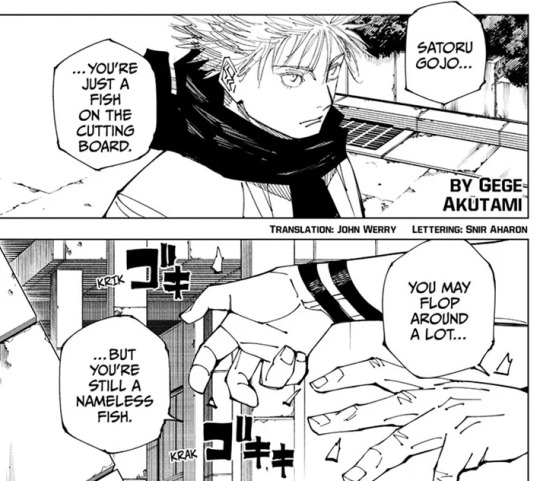
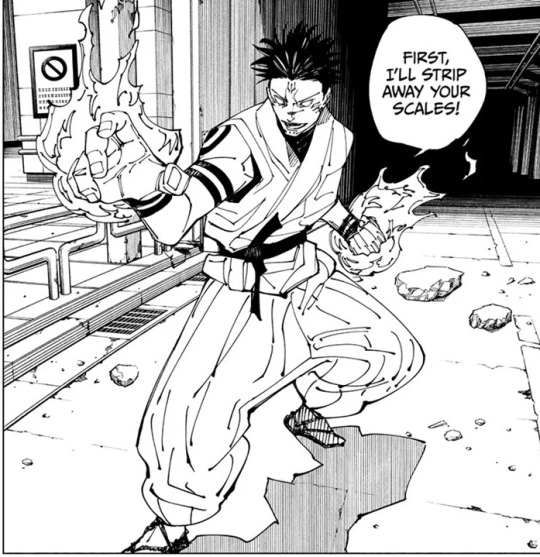
Less relevant but still interesting - there’s also a Buddhist reference here, according to this forum post:
At surface, straight value, it is just the literal scales of a dragon. The word can also be used to mean "a large quantity of things". Ryurin is also a metaphor for the power/authority/influence of heroes and of the Heavenly People (the residents of the Japanese version of the Devaloka, where devas and gods reside. Just a heavenly realm, basically.) Lastly, Ryurin means a dangerous condition/situation or a dangerous thing. So. For Sukuna, its basically 'dangerous divine power/authority'.
2. "反発"
Next, "hanpatsu." Hanpatsu means recoil, which is the equal and opposing force of an action. This describes Purple, which is the rebounding damage created by the collision of Red and Blue. At first I thought hanpatsu described Red, because Red is a “repulsing” force. Except “recoil” is not the same thing as repulsion. Another possibility was that hanpatsu described the relationship between Red and Blue — Red as the “equal and opposite” of blue, and vice versa. But we know the two aren’t equal in power, and neither technique is accurately described as the “recoil” or rebounding force produced by the other.
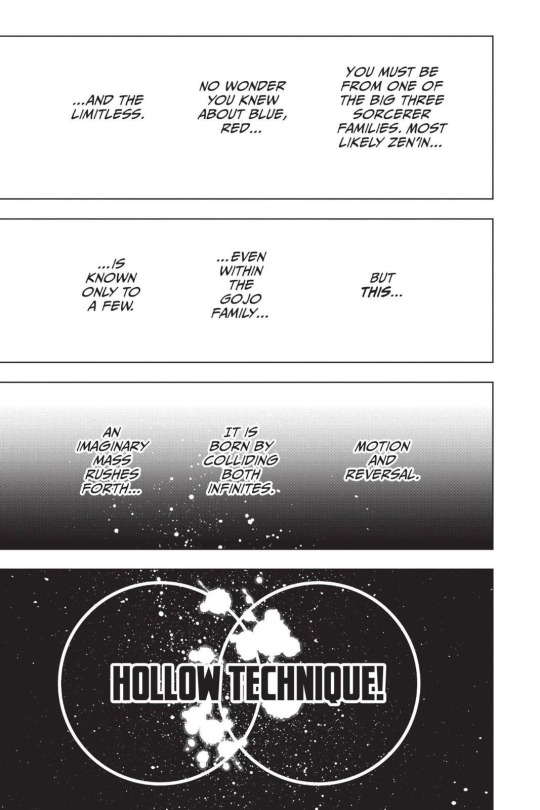
3. "番いの流星"
Finally, "tsugai no ryuusei." A few things here. First, the wordplay and translation. Like ”Ryuurin”, this term references dragons. Here Ryuusei, meaning meteor or comet, is also pun on the word dragon, ryuu (which isn’t novel, see the Japanese word for Pokémon move Draco Meteor, et al.). So a plausible English translation could also be “Twin Dragon Meteors.” Second, how dragons are relevant to Sukuna’s mythology. In Hida, there is a temple Senkoji said to be founded by “Ryomen Sukuna … approximately 1,600 years ago. A central architectural feature of the temple it Dragon Ceiling, a portrait of two dragons painted by Kano Tansetsu on the ceiling of the main buliding. From the website,
According to temple legend, a general of the Sengoku period committed suicide there by seppuku, staining the floor with blood. For the repose of general’s soul, the floorboards were incorporated into the ceiling of the main temple. Some time later, Kano Tansetsu visited Senkoji and painted the dragons on the ceiling. At Senkoji, the objects of worship include not only the main temple and the priest’s quarters, but also the entire temple complex.
According to this Reddit post, the temple’s founding tale describes how Sukuna fought off a dragon god living in the mountain and built a shrine in its place. So — from the fact that dragons are the mythological enemy of the figure Ryomen Sukuna, we may infer that the words of the incantation refer to an enemy or target of the World Slash technique.
What could "twin meteors" refer to other than the related techniques of Limitless, the twin floating spheres Red and Blue?
Another potential connection to Red/Blue rooted in dragon mythology is the tide jewels — the tide-ebbing (a repelling force, like Red) kanju and tide-flowing (an attracting force, like Blue) manju, possessed by Ryuujin, the Sea King.
The final reason I think the incantation refers to Gojo’s technique is because of Sukuna’s explanation in 236 for World Slash — he describes the process of developing the technique as figuring out how to target Limitless with Dismantle. So it makes sense that the incantation to power World Slash operates by describing its target, not World Slash itself.
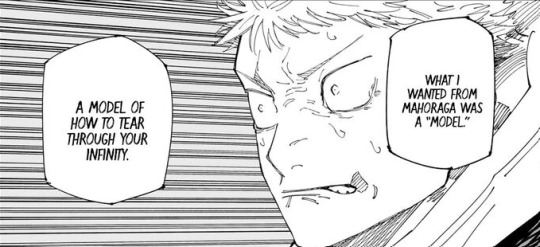
It also lends significance to the order of the incantation — first visualizing the most generalized application of Limitless (ryuurin), then passing through Purple (hanpatsu) to finally arrive at two separate applications, Red and Blue (tsugai no ryuusei) — a conceptual "bisection" of Limitless into two discrete components.
4. Binding Vows
Isn't this pretty romantic? But wait there's more. We know now after Chapter 255 that in exchange for unleashing the World Slash that killed Gojo without using the hand sign, Sukuna now has to recite the incantation every time (+using the hand signs and directing the attack with his palm) he uses World Slash.
Assuming what I've previously argued is true (the incantation describes Gojo's Limitless), this gives Sukuna's last words to Gojo another layer of significance. When Sukuna tells Gojo he will never forget him, it's not just an expression or a promise, but a statement of the binding vow Sukuna has to make in order to land the killing blow. In other words, the cost of killing Gojo is having to remember him forever, to integrate him into Sukuna's own technique through a verbal invocation that must be made every single time Sukuna uses the world bisecting slash. Yeah, that's pretty romantic.

#ryomen sukuna#gojo satoru#sukugo#A love which bisects the world. truly this is our sukugo kaisen#jjk meta#jjk#jujutsu kaisen#jujutsu kaisen meta#idk what else to tag this as#binding vows#?#jjk analysis#pardon some of the writing here this was originally a text msg I sent to a friend#it’s a very wordy outline pretending to be an essay
370 notes
·
View notes
Text
I just realised that the word sashisu also refers to the 3 main seasonings in Japanese, like *sa* as in satou (sugar), *shi* in shio (salt) and *su* is vinegar. sugar-salt-vinegar trio.

#sashisu#satoru#shoko#suguru#sashisu jjk#jjk#jujutsu kaisen#gojo satoru#ieri shoko#shoko ieiri#geto suguru#jjk geto#getou#getou suguru#gojou satoru#ieiri shoko#Jujutsu kaisen manga#jjk anime#jjk trio#hidden inventory arc#jjk 0#jjk prequel#Jujutsu kaisen meta#jjk meta#jjk gojo#gojou#satoru gojo#jjk shoko#suguru geto
236 notes
·
View notes
Text

till death do us part—the fate of the six eyes and zenin clan leader from satoru’s story
#cw blood#atsushi zenin#arashi gojo#jjk#jujutsu kaisen#jjk oc#jujutsu kaisen oc#six eyes#zenin clan#gojo clan#jjk meta#jujutsu kaisen meta#arctvros
533 notes
·
View notes
Text
The reason why Nanami and Yuji's relationship makes me so soft is because Nanami isn't like the typical mentors we see in shows or movies. Yuji hesitates to use violence on others (in one chapter I remember Nanami being taken aback by just how much Yuji cares for the wellbeing of others, even if it is a curse) and Nanami understands this. He doesn't force Yuji to do it even though it's what needs to be done. He takes up this nasty work himself so that Yuji's youth and innocence could be protected for as long as possible. And this is why "being a child is not a sin" holds so much significance. Yuji thought it was Nanami underestimating his abilities to fight but it was actually that Nanami wanted to protect Yuji from that rotten jujutsu world.
#jujutsu kaisen#nanami kento#kento nanami#jjk headcanons#jjk imagines#yuji itadori#itadori yuuji#dad nanami#dadnami#nanami and yuji#nanami fluff#nanami kento fluff#nanami kento angst#jjk meta#jujutsu kaisen nanami#jujutsu kaisen meta
2K notes
·
View notes
Text
Kusakabe and Nanami - Suits and Ties
Did anyone suggest I analyze suits and ties for two of our JJK DILFs? No. But will I go into extensive detail about Kusakabe and Nanami's suits? Yes, I will.
TIE SELECTIONS AND KNOTS Kusakabe - Half-Windsor

The Half-Windsor is a practical, classic knot, perfect for someone like Kusakabe, who is adaptable and efficient. Professional without being overdone, the knot size fits well with a medium-sized collar (which is logical for his build) and pairs effortlessly with virtually any suit fabric. The look stays polished and put together, whether with the suit or the trenchcoat.
The color is a conscious choice. The darker shade of green follows traditional suiting conventions, where a bold accent piece complements a simple foundation like his white shirt and black suit. It allows Kusakabe to keep a professional look while adding a subtle touch of individuality.
Even the mechanics of the knot make sense for Kusakabe. It uses less length than a Full Windsor, and is ideal for a taller and broader body shape. For Kusakabe, this means he can comfortably wear a standard tie length (57–58 inches) instead of buying a bespoke or specialty tie (67–71 inches).
Nanami - Full Windsor

The Full Windsor is symmetrical and more formal than the Half-Windsor, which aligns with Nanami's structured, meticulous personality. While it's traditionally paired with wide collars, the fuller shape also works well with medium-sized collars (again, the best choice for a broad build). It pairs best with a heavier suit fabric like worsted wool, which is expensive but surprisingly durable.
Gege did the research -- this knot works best with patterned ties featuring a larger, spaced-out print. And men's suiting conventions actually recommend a golden yellow to complement a tan suit and blue shirt combination. Nanami is perfectly fine dropping $200 - $300 on a custom tie. This is the man out there fucking up curses while wearing a $5,000 Tag Heuer watch.
Since Nanami wraps a lot of fabric around his hand, the Full Windsor’s need for extra material makes perfect sense; it works best with longer ties. In terms of mechanics, the Full Windsor is also the easiest knot to undo, making it a practical choice in a fighting situation for Nanami, who doesn't waste time on anything.
JACKETS AND LAPELS Kusakabe - Black Jacket and Notched Lapels

The mid-notched lapel is a staple of classic suiting. (I'm including pictures of his trenchcoat as it has similar notching.) Though it’s not always visible in the manga, it is reasonable to assume that his single-breasted black suit includes a left chest pocket and boutonniere buttonhole — little details Kusakabe wouldn't overlook. His choice of a black suit is practical as always: stain-resistant (keeping the cursed spirit dry-cleaning bill in check) and low maintenance.
The mid-notched lapel is easily dressed up or down, mirroring Kusakabe’s ability to adapt without losing his sense of self. Every detail shows that he’s grounded in tradition but always prepared for the realities of the present.
Nanami - Tan Jacket and Peak Lapels

Nanami’s suit features sharp, angled peak lapels, which give it a more formal edge compared to the standard notch lapels. Like Kusakabe, he opts for a single-breasted design but with three buttons instead of two (we know he loves symmetry). This choice aligns with his look in the 2022 JJK Dolce & Gabbana collab, showing that the peaked collar is a style he favors, reflecting his appreciation for both luxury and craftsmanship.
His clothing, functional yet carefully selected, serves as an investment in both quality and precision. For Nanami, a polished image goes beyond appearance. It’s about the thoughtful, intentional choices he makes both professionally and personally.
Ultimately, Kusakabe and Nanami’s suits capture their personalities in different ways. Kusakabe’s style is about practicality and ease, with just enough polish to stay professional. On the other hand, Nanami goes for something sharp and more structured, with a high attention to detail. Each piece of their suits speak to the thoughtfulness behind their choices, reflecting the balance of simplicity and sophistication they each bring to their lives.
I DO NOT authorize use of this meta for other writing!
#kusakabesimp#jjk meta#look I know I'm crazy but tbh don't care#jujutsu kaisen meta#kusakabe atsuya#atsuya kusakabe#nanami kento#kento nanami#jjk#jujutsu kaisen#jjk manga#jujutsu kaisen manga#kusakabe jjk#jjk kusakabe#jjk nanami#nanami jjk
112 notes
·
View notes
Text
Yooooo hold on.
So if Yuuta cursed Rika by thinking “don’t leave me.” so hard she manifested into a cursed spirit, Suguru’s “at least curse me at the end” to Satoru would then mean, “don’t let me go.”
It’s like saying, “Curse me like Yuuta did to Rika. Love me so bad that you can’t let me go. Hold on to me.”
#i cannot stop seeing it#and then satoru rly couldn’t let him go#he got his wish#but at what cost#jujutsu kaisen#jjk#satosugu#gojo satoru#geto suguru#stsg#suguru geto#satoru gojo#jujukai#jjk spoilers#jjk meta#jujutsu kaisen meta#jujutsu kaisen analysis#satosugu angst#satosugu analysis
853 notes
·
View notes
Note
hey, i was just wondering what are your thoughts on the final chapter of jjk…
The End
This is gonna be a little detailed. I am gonna first give a short answer and what I liked and disliked, then a little more detailed one. This is about ending as a whole.
I remember I did quite some research during my college time on post modernism and existentialism because i had to write an essay (it isn't about that) but I will be referring to what I researched here and there, when put forth my points.

Short answer- I am content with the ending. I am also surprised since this is the first time gege wrote a full manga for the first time, but he still managed to give an ending better than most. And any gripe that still remains, I will not hold it against the author cause the story and characters aren't real, Gege is.
Yuji, Sukuna, and Gojo's character have some of the best conclusions within the story (unpopular opinion probably 😮💨). The way they were written and the consistency with regards to their characterization was amazing.
As for what I am conflicted about, well, it's Megumi's character. I don't know how to say it, I liked it his conclusion, but I wish there was more introspection to how he reached there. But alternatively, I talked with a moot of mine, and they think the lack of introspection from Megumi is quite in-character. He decided to live for others once again (i.e., he didn't address his problems at all) and he is finding peace and comfort in the cage he is stuck at, it's such simple decision from his part, cause he is very clueless about his own psychology, and this is the beauty of it, that we as readers know what caused him to make that decision-according to my moot. I highlighted this one, cause this interpretation stood out the most. I also talked with other people, who seem to hold dislike for the lack of introspection from Megumi's end. While I am still conflicted, maybe I will address in some other posts or not at all, idk, but right now, I haven't formed my opinion on it. But I am satisfied, to say the least, conclusion itself isn't bad for me.
Detail:-
I like that it's more about evolving and coexistence rather than breaking the cycle or one conclusive solution. Regardless of Sukuna's or Yuji's existence, the curses will always continue to exist. It's humans' negative emotions that create curses in the first place. If the negative emotions of humans can't cease to exist, then curses won't either. Jujutsu Kaisen in a way rejects the idea that life can just have a start, middle, and end, or that one single truth/solution can provide closure. Maybe things can get worse in the future, maybe things can get better, that's up to you to decide, in that particular sense, it's open-ended.
You may ask what was even the point then? Well, let me offer a perspective, although it's just my interpretation, you don't have to agree to it...
When characters within a story accept a belief, perspective, or solution as the only truth, it can lead to their failure, especially if that belief oversimplifies a complex reality. But, one character who comes to understand the complexity can find a way to coexist with the chaos or ambiguity, though not necessarily "fixing" things.
In narratives such as these, the answer isn’t just a rejection of truth but a recognition of multiplicity, the presence of multiple perspectives, interpretations, or meanings within a single work or the idea that one truth or solution cannot account for the full stretch of experience. The character who realises the absence of a single "fix" often ends up navigating the challenges in a more nuanced way. They may not succeed in traditional terms, but they endure by accepting life’s complexity.
Many characters within JJK try to find some single "fix" to the system or the problem of curses and cursed energy and each of them had very flawed solution which we see failing--Yuki/Kenjaku/Geto were all extremists in that sense, one of my friend mentioned this in twt, Yuki wanted to completely break away from CE but also she didn't have any concrete plan, and Kenjaku who wanted to optimise it, but never really knew what merger could do, himself. Even Geto knew that killing all non-sorcorers is not possible.
Sukuna/Gojo-- both their ideals were extremely flawed. Many people have written amazing analysis on this, so i won't go in detail. But we see in the story how strength was the reason for both their solitude and which led them to path of their own death. But Sukuna perfected what Gojo didn't, sukuna completely threw away his humanity and was content living as a curse. A hollow human, who only ever cares about strength, he deemed love worthless, like Gojo deemed love to be the most twisted curse. However, gojo still wanted connections at the end of the day, and this kept him a little more humane than sukuna, who became a monster who clung to life wanting to stay at the pinnacle.
I liked that in the end Gojo realised that Yuji and other should follow their own path rather than just following his goals (although he would've like that) and I am glad they didn't follow his footsteps.
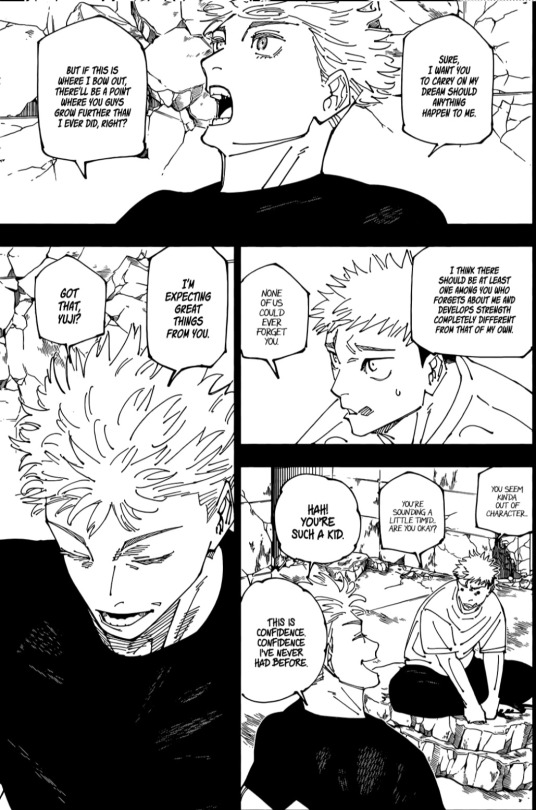
This conversation between sukuna and mahito just added so much to their characters.
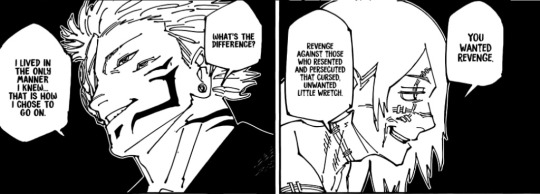
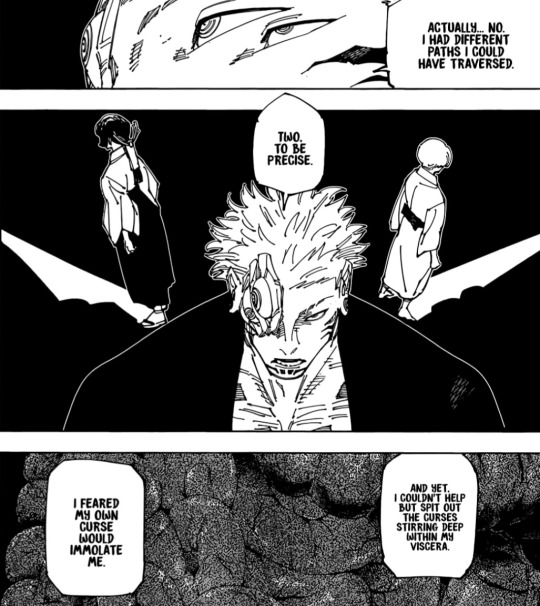
Sukuna is the man who perfected his ego. He discarded his humanity till his last breath. Sukuna says he was an unwanted child (maybe cause he ate his twin in his mothers womb, someone on twt pointed out that this is similar to biological condition called "fetus in fetu") and he internalised this all and lived his whole life as a curse, only ever caring about his pleasures and displeasure and being the pinnacle. But even a perfected ego gets humbled in death, and the same happened with him. He acknowledges that he could have taken a different route, and if there is a next time, it would be nice to walk on a different path. Beautiful, honestly.
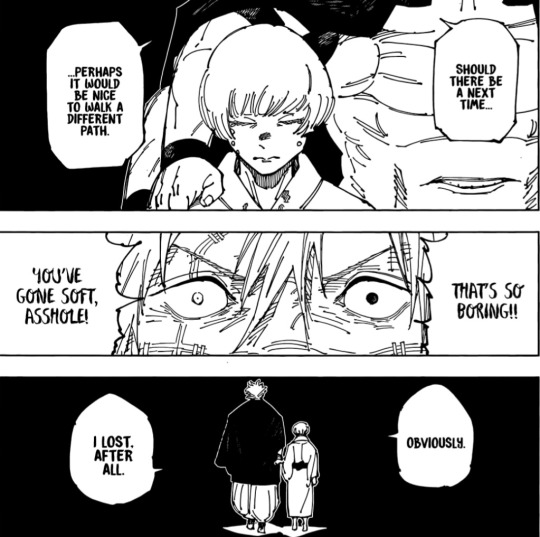
Now, Mahito is the literal manifestation of humans' hatred for others. He is a true curse, and he wasn't able to reconcile with his humanity after death because, unlike sukuna, he has none, he is not human. He is the manifestation of the same cycle of human hatred, he didn't change, he is the only one left sulking like a child. As I mentioned before, if the negative emotions of humans can't cease to exist, then curses like mahito won't either.
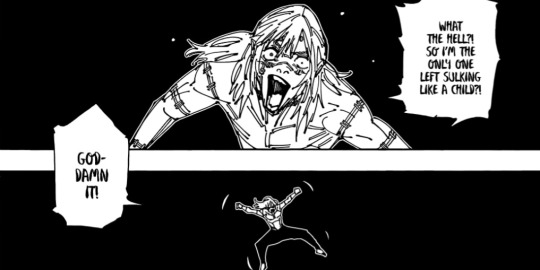
You could then say - well, then nothing changed?
I mean, is it really nothing? Tengen is no more, and this is the curse user Yuji, Megumi, and Nobara caught, and what happened to him?
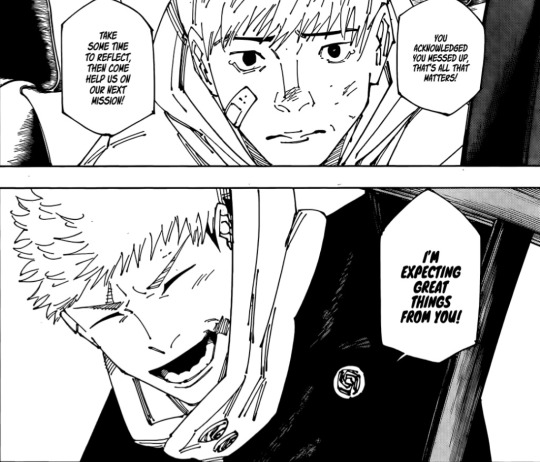
Earlier, he probably would have been executed, but now Yuji offered him a chance to change.
Yuji turns out to be the person who learns to coexist. He is, for me, the best written character within the story with the best conclusion.
Now, let's just say that doesn't mean anything, nothing changed at all, there was no point...
However, the idea that "nothing changed" often misses the deeper layers of such narratives, which are less about external change and more about internal realizations, the acceptance of ambiguity and even the rejection of simplistic resolutions.
The "point" is not necessarily achieving change or a clear resolution, but rather witnessing the struggle itself. How characters navigate or accept a chaotic/indifferent universe.
There are two examples I can think of, first one being, Camus' "The Myth of Sisyphus", Sisyphus endlessly pushes a boulder up a hill, only for it to roll back down, its completely futile, yet the "point" is his perseverance. The second one is "Waiting for Godot" by Beckett, nothing really appears to happen in the story, and characters seem stuck in a cycle of waiting for this supposed person calles Gadot. However, the "point" is in the waiting itself. It's a reflection on the human condition, the search for meaning, and how we deal with uncertainty and the passage of time.
Thus, the point of such narratives is not in "what changed" but how we live with things not changing, how we adapt, or re-contextualise meaning of things when the world resists easy solutions or "fix its". It's reflectimg on the messiness of real life, where change is often slow, subtle, or non-existent, and simple answers are rarely seen.
So it's up to you to decide what you wanna make of this ending. Personally, I am very, very content.
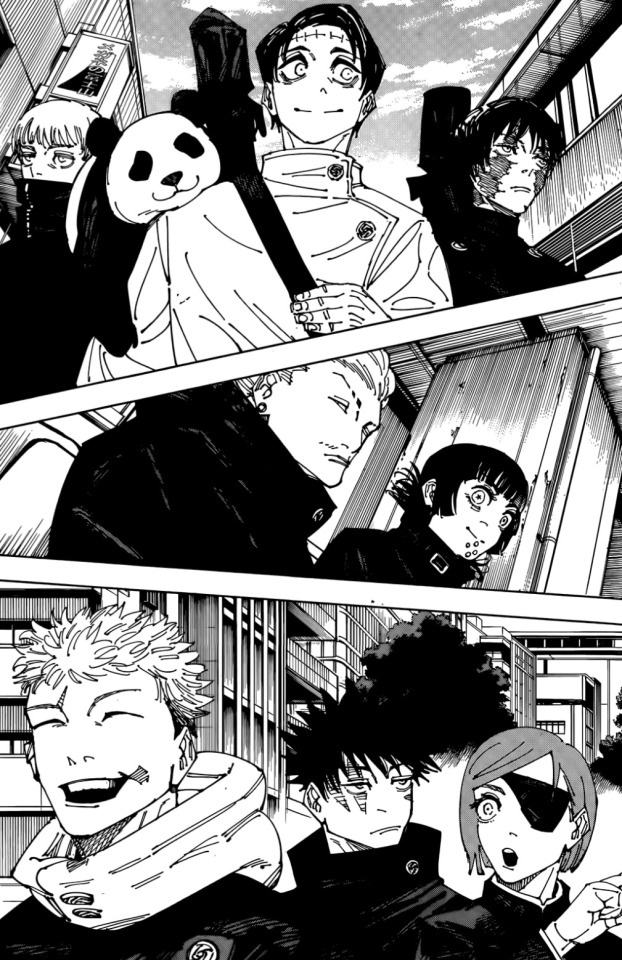
(Again, this is my interpretation, I could be completely off charts, and I don't mind, maybe I will change my mind after thinking about it again, or maybe not, but one thing remains, that I throughly enjoyed all 4 years I was reading this manga. Peace✌️)
#jjk#jjk meta#jjk ending#jjk 271#jujutsu kaisen meta#yuji itadori#itadori yuuji#megumi fushiguro#gojo satoru#ryomen sukuna#mahito#fushiguro megumi#sukuna#jujutsu kaisen#thank god its finally over now#i hope people also move on one day and take some good memories from it#i will wait for gege's next work for sure#now imma focus on other books and mangas i am reading#jjk spoilers
76 notes
·
View notes
Text
in the season two op, we see gojo with an umbrella, rushing over to meet geto. despite the fact that he literally doesn't need one, gojo very clearly brings the umbrella for geto; this is made obvious because this scene is intercut with shots of geto impatiently waiting in the rain and holding a bag over his head.
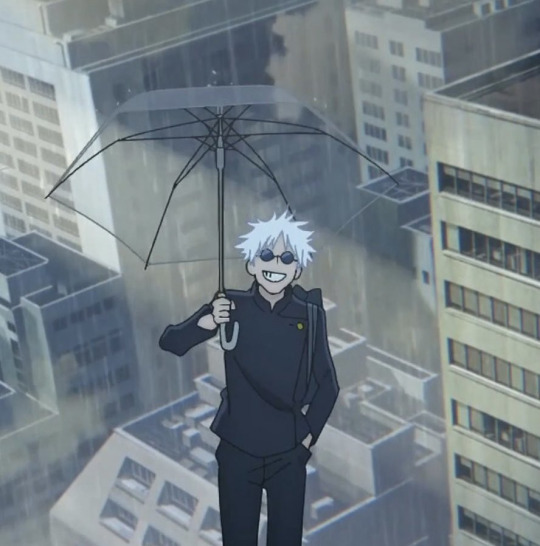
in the season one op, he's once again walking through the rain, but this time he doesn't have an umbrella.

the absence of an umbrella in the rain is stark in comparison to the season 2 op, where the umbrella is the focal point of gojo's stroll through the rain. in season 1, literally everyone else in the opening has an umbrella, making the absence of gojo's even more noticeable.
in both openings, he's walking in the rain. but only in one of them does he have an umbrella, despite the fact that he doesn't need it in either of them.
if you notice something is missing from a room, it's still there, isn't it?
#not to mention gojo is going to geto's FUNERAL in the second one#my jjk meta#jjk meta#jujutsu kaisen#satosugu#satosugu angst#satosugu analysis#jjk#gojo analysis#jujutsu kaisen meta#jujutsu kaisen analysis#gojo x geto#gojo satoru#geto suguru#stsg#gojo#geto#jujutsu kaisen angst#gojo angst#geto angst#geto and gojo#satoru x suguru#satosugu brainrot#stsg angst#stsg brainrot#gojo brainrot#jjk geto#jjk gojo#jujutsu kaisen season 2
2K notes
·
View notes
Text
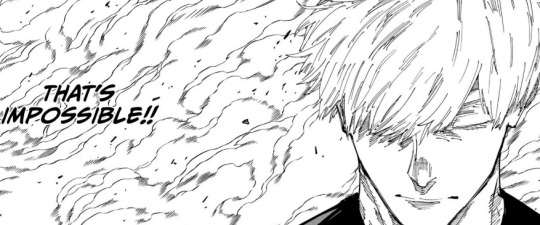
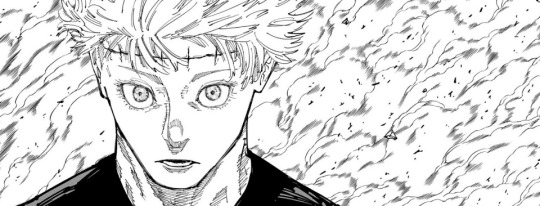
The Next Gojo Satoru
As you've probably guessed I have a lot to say about this chapter. However, right away I want to start out by pointing out once again that the fandom is taking a mostly gojo-centric view of this chapter. Which I understand it's Gojo's body that's being puppeteered around and dehumanized in the exact same way that Kenjaku one of the sickest and most inhuman characters used Geto's body.
However I think it shouldn't be understated how shocking it is to see Yuta betray all of his values like this. The most human character who represents love in the cast has given up on the cast and betrayed someone he loves. So let's talk about what this all means for Yuta under the cut.
GOJO GETS AN F IN TEACHING.
I understand why most of the focus is on Gojo, because yes Gojo's body is the one being violated here. He's not even allowed to rest in death after fighting on the front lines against Sukuna to the point where his brain was hemmoraging in the middle of battle and he was brutally cut in half.
Considering how much horror Gojo experienced when he saw Geto's body taken from him and made into Kenjaku's pupet. Cosidering the horrible pain that Nanako and Mimiko endured just seeing Geto's body still moving around denied a good death (Nanako and Mimiko were tellingly willing to let go and not try to take revenge against Gojo for killing Geto because of their friendship even though Geto was their whole world, but they'd never forgive Kenjaku for taking his body). Considering that Gojo even went out of his way to say he wanted to kill Kenjaku / Geto on Christmas Eve again in order to give him a proper burial it's understandable how horrifying this update is.
This is also a series where the two main antagonists are parasites who take the bodies, and steal away all bodily autonomy from characters like Yuji and Megumi and then force them to do horrible things they would never do and bear witness to it, such as the slaughter at Shibuya, or the murder of Tsumiki at Megkuna's hands.
It's understandable how people had such a visceral reaction to this chapter. However, I think the fandom has a tendency to paint Gojo like he's the central victim of all of Jujutsu Society when he's both victim and perpetrator.
Gojo is someone who has only been regarded as the strongest his entire life, and been used as a tool to keep Jujutsu Society stable his entire life. Gojo is also someone who never tried to be anything other than the strongest, never tried to empathize with anyone other than those who were just as strong as he is, and who raised all of his students to be tools too.
To illustrate my point here's an incredibly similiar character from Tokyo Ghoul: Arima Kishou. They are so similiar that they're both white haired mentor characters to the protagonist, they're both the strogest in their respective worlds, and Gege straight up copied this section of panels from the Tokyo Ghoul Manga.
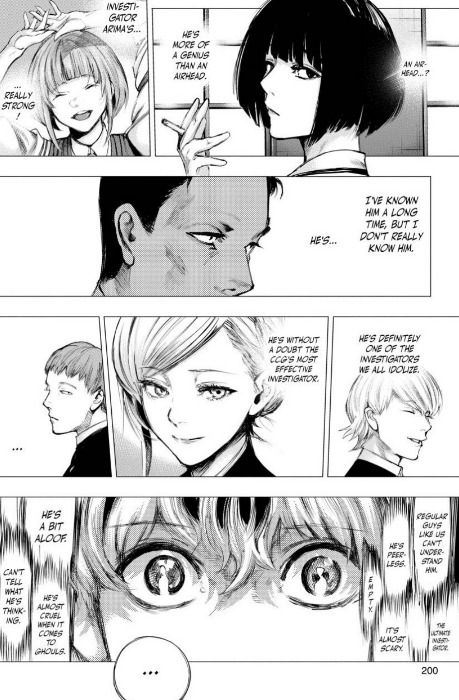
Arima is a breeding project, who was bred by the Washuu Family who mxies blood between humans and ghouls through a series of controlled marriages for the purpose of creating hybrid ghoul human children. Arima isn't the ideal hybrid they were looking for, but he was so ungodly talented he quickly rose to being the most powerful and well-respected investigator in the CCG.
However, this is how Arima reacts to the fact that his entire purpose in life was just to be a weapon to kill ghouls.
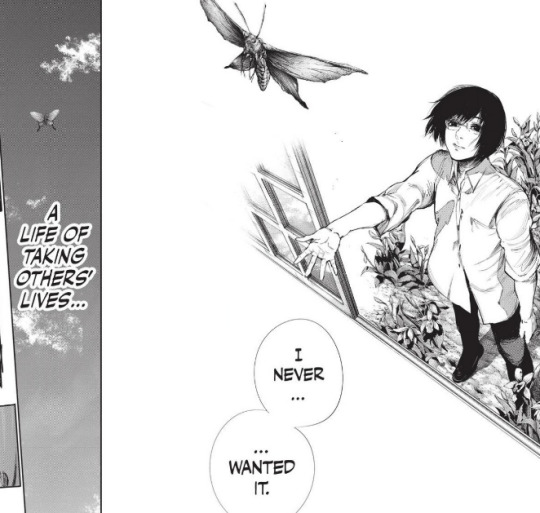
Arima loathes violence, he loathes being an investigator, he loathes himself most of all and designs his entire political revolution around him finally being killed by Kaneki - to punish himself and also to relieve himself of the burden of living a life where he was only meat to kill others.
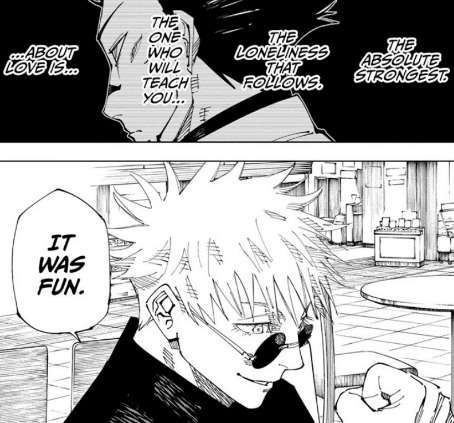
Gojo on the other hand loves being the strongest, he lives for Jujutsu. Arima's death is tragic and nihilistic believing his life had no real worth because all he ever was was a weapon to hurt others, whereas Gojo died satisfied.
Arima's last battle against Kaneki is grim, silent, and tragic, he does everything he can to make Kaneki despise him, to force Kaneki to kill him by being the worst version of himself and when Kaneki still wants him to live he just slits his own throat because even if Kaneki forgives him he can't forgive himself. Gojo laughs his head off and has the time of his life fighting against Sukuna, and going out in a blaze of glory.
Gojo dies smiling, Arima dies finally breaking into tears after a life of pretedig to be cold and emotionless. Gojo's dying regret is 1) that Geto wasn't there to say goodbye to him, and 2) that he wasn't able to draw out all of Sukuna's strength. Arima's dying regret was all the pain and suffering he caused throughout his life and how he was never able to rise above his circumstances and be anything other than what he was born to be.
These two characters are incredibly similiar, they are both the strongest, and they were both made into tools by a dehumanizing system they were born into. However, their attitudes are entirely different. Gojo enjoys being strong, and yes part of it is that Gojo himself doesn't realize he's a victim or what society has groomed him into becoming, but the other part is just because it's an ego trip for him. Gojo doesn't see himself as the tragic victim his fandom makes him out to be.
If you were to transplant him into Tokyo Ghoul Gojo would be happily killing ghouls, and he would think killing ghouls is fun because he's the strongest and best at killing ghouls. This is the complexity that is Satoru Gojo, he has been dehumanized and put on a pedestal his ow life, but Gojo also enjoys being on that pedestal and won't ever step down from it willingly.
I'm not saying that Arima is a better person than Gojo. I think the fact that Gojo doesn't think of himself as a victim is tragic in its own right, because he lacks the self-awareness to actually grow and change as a person. In the end both Arima and Gojo believe they couldn't be anything better than what they were, and their only release is death which is just insanely sad to me because as long as the future exists people always have a chance to get better no matter who they are. To give up on the future, to see an early death as a good thing simply because you can't endure life any longer is one of the most hopeless things imaginable.
Gojo's not sad because he was born to be a tool exploited for society's benefit, he's sad because he was lonely. He doesn't even realize it's his own darn fault he's lonely, because not only has Shoko said that he's not alone she's always been right there, but this chapter we get a repeat of Gojo's students begging him to let them in and Gojo himself decided to draw that line between himself and others and thinking an enlightened, godlike being like himself can't possibly be understood.

All of this to say I think Gojo is the sole victim here, but he's the middle of a chain of of victimhood. I think ultimately the biggest victim here is Yuta, and yes I will not only play trauma olympics here I'm going to win.
If this chapter goes to show anything it's that Gojo has completely failed in his ideals of protecting the youth from the dehumanizing system of sorcerers that takes children and reduces them to cogs in a machine.
A lot of people criticize Jujutsu Kaisen for dropping basically all of its political elements and themes of reform in the second half after Shibuya, and while I understand the criticism I think Gege intentionally shifted away from politics because Gojo's political revolution was never going to succeed.
From the beginning Gojo's solution to reforming Jujutsu Society and it's habit of taking away the youth of children and raising them up instead as child soldiers is... to make stronger child soldiers.
This is Gojo's blindspot and it has always been Gojo's blindspot.

It's why Gojo is completely okay with someone like Mei Mei who at the best uses her brother as a human shield to get out of curse domains and has stolen his entire childhood away to make him own pet little shoulder, and at worst actively molests him.
It's why Gojo is stated in the databooks to have only taken an interest in Megumi and Yuta because they were strong.

Gojo understands that he's being exploited by Jujutsu Society, but doesn't understand you need to deconstruct unfair systems of power and exploitation in order to build something better. Gojo from the beginning only had one plan, and that was to replace the people at the top with his own allies who'd support his agenda. He just thought waiting for them to die out and the children to grow up was the more peaceful way of doing it.
Gojo's political revolution was doomed from the beginning and that's why we see him go back on his word this chapter and just slaughter everyone at the top. His choice of a new leader for Jujutsu Society is hardly better than the elders, the person who executed Gojo's teacher and tried to get all the children to kill Itadori early on. Good choice.
This is what Gojo said would happen though, if he just wiped everyone out at the top no real systemic change would occur because they'd just be replaced with someone who wasn't that differet. Gojo's just given up on the notion of lasting change out of pragmatism.

Which is why Gojo himself is not that different from the elders in the first place, not because he's a bad person but because he was shaped by that same society and he's the pinnacle of that society.
I think the thing is and this point often gets ignored - a lot of the choices the elders make are because of outdated traditions like choosing to oppress Maki and Toji just because they challenge the traditional notions of cursed energy.
However, some of the decisions they make are out of cold hard pragmatism. Gakuganji actually turned out to be right in his assassiation attempt against Yuji Itadori. If they had succesfully killed Yuji, then the massacre in Shibuya would have been prevented and likely Kenjaku's plans would have been pushed back. The elders didn't sentence Yuta to execution just to be cruel, or just because they're superstitious but because he's already had several incidents of nearly killing people because he can't control Rika.
It's easy to dismiss the Elders as evil because they're just faceless entities, but then we witness in this very same chapter the main characters making the same heartless decisions out of the same sense of pragmatism.
Gojo understands Jujutsu Society is flawed, but doesn't understand exactly why it's wrong. He doesn't raise his students to be independent free thinkers because then they might question him, he raises them to be very powerful because that's more pragmatic.
Here are the next generation of sorcerers who are going to bring about the change to Jujutsu Society that Gojo so desperately seeks.
Nobara Kugisaki: Dead
Hakari Kinji: His greatest ambition is to start a fight club
Yuji: Actively calls himself a mindless cog and just wants to kill whatever society points him at and tells him to kill.
Maki: Mass murderer.
Yuta: Just stole Gojo's body and said he had to become a monster i Gojo's place.
Megumi: Begging to be killed.
Inumaki: Tuna Mayo
Panda: Is a Panda
(Joke lovingly ripped off from @kaibutsushidousha)
I understand that fighting Sukuna takes precedence now, but do you think once the dust settles any of these characters are going to do anything to make lasting change?
Are we going to see anything for them at the end of the road other than a mountain of their fellow sorcerers corpses?
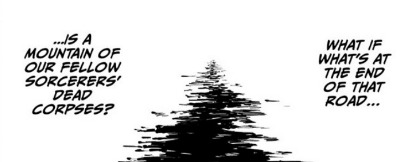
Gojo didn't nurture his students to grow into healthy adults, he raised them into stronger child soldiers and yes that's the pragmatic thing to do to help them survive in the Jujutsu World, but the elders make those decisions out of cold pragmatism as well.
MHA is also showing a story where the children are failing to learn from the previous generatio's mistakes, but it's far less frustrating to watch in JJK because it almost seems like that's the point?
Maki sacrificed Mai for the sake of becoming someone strong enough to reform the Zen'in Clan, only for her sister to die and Maki to slaughter the rest of her family failing in both her goals to reform her clan and protect Mai.
Yuji became the host of Sukuna in order to help others, because the total deaths of people in the world would go down if he ate all the fingers. Not only did that decision lead to the death of thousands in Shibuya, but he's even lost his role of being Sukuna's host to Megumi.
Yuta wanted to find a reason to live and a purpose in protecting his friends, and also wanted to pay back the man who saved him, not only is Yuta choosing to die in a way that breaks his friends heart he's also violating his beloved teacher's bodies.
There's a lot of arcs like this where characters fail in what they set out to accomplish, because like in most tragedies they don't try to grow as people they only care about getting stronger. It's the same choice over ad over again, a decision made of cold pragmatism that brings about their tragic ending.
I think it speaks to why systems like this perpetuate themselves, because it becomes so hard to hold onto your humanity that even trying gets you actively punished all the while people like Mei Mei crawl to the top. However, even if you throw your humanity away purely as an act of survival you're still helping perpetuate that system instead of fighting against it.
Anyway, that's enough hating on Gojo, onto the main event.
THE NEXT GOJO SATORU.
It's almost masterful how perfect the foreshadowing for this chapter's twist was. Yuta sharing a common ancestor in Sugawara with Gojo.
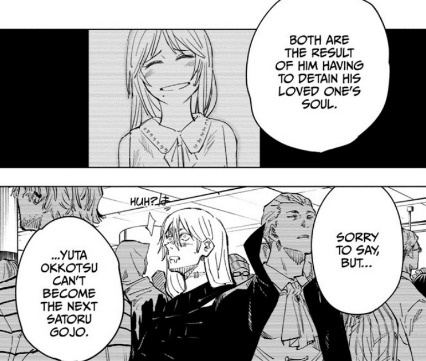
The irony that Kenjaku said out loud that someone like Yuta could never become Gojo, on top of the fact that Yuta's true power comes from detaining his loved ones soul. He's turning Gojo's body into a weapon the same way that he once used Rika's vengeful cursed spirit as one (he even channels her strength into a sword, the same way Maki uses the sword that Mai gave her life to create in battle).
The way that Yuji's first impression of Yuta from his powerful presence and cursed energy alone was calling him someone even creepier than Gojo.
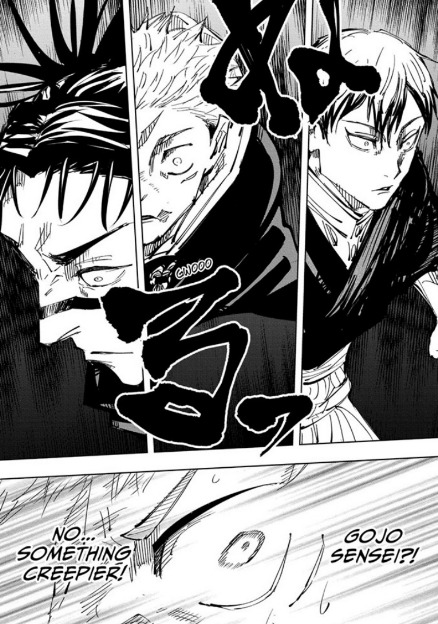
The idea that Kenjaku has been trying to get his hands on the six-eyes for years, which is what led most of the fandom to theorize a possible Kenjaku return by stealing Gojo's corpse. The fact Tengen said the six eyes, himself and the star plasma vessel are all connected and one time Kenjaku killed the six-eyes from a child only for another one to appear right away.
Yuta being told he could never reach Sukuna's heights because he lacks the selfishness of a calamity.
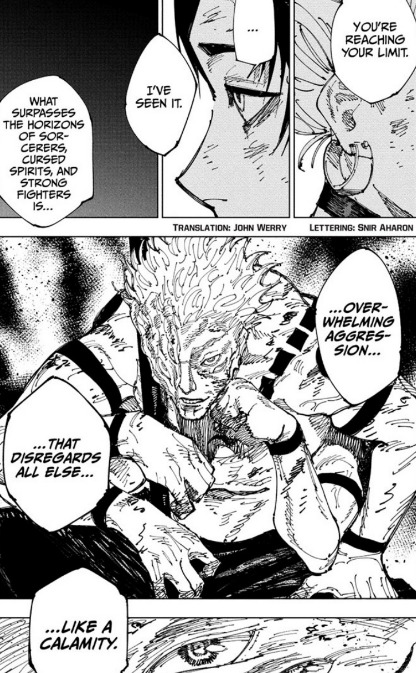
Even Yuta trying to tell a nameless assassin Uro to be less selfish, only to be chastised by her for not understanding because it's impossible for someone as blessed as he is to know what it's like to not have a name, to not have a face, to not be someone important.
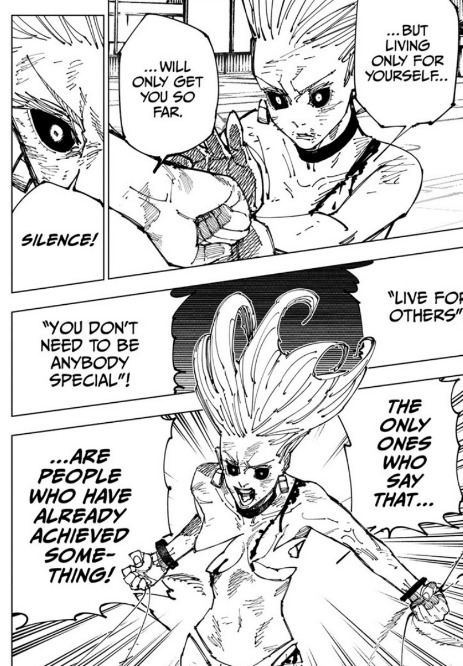
Now here Yuta is, not only is he making the selfish decision to use his teacher's body as a tool, he's also most likely in five minutes going to die in someone else's body, having sacrificed not only his name, and face, but also his personal values in order to become a monster.
This arc makes it seem like Yuta's gone against everything he's stood for, making his arc a complete circle from Jujutsu Kaisen Zero and that's kind of the point. Heck, even something as small as Yuta's decision to show mercy to Ishigori was rendered pointless because Sukuna immediately killed him soon after taking Megumi's body.
If Yuta's regressed in his character it's because Gojo's purpose was not to raise these children into healthy adults, but strong soldiers.
What happened to Yuta is a direct consequence of the way Gojo recruits these children, and the underhanded motivations he has behind those recruitments.
Yuta's decision to take Gojo's body is more tragic on Yuta's part then it is on Gojo's, because Yuta is a child, and Gojo is an adult.
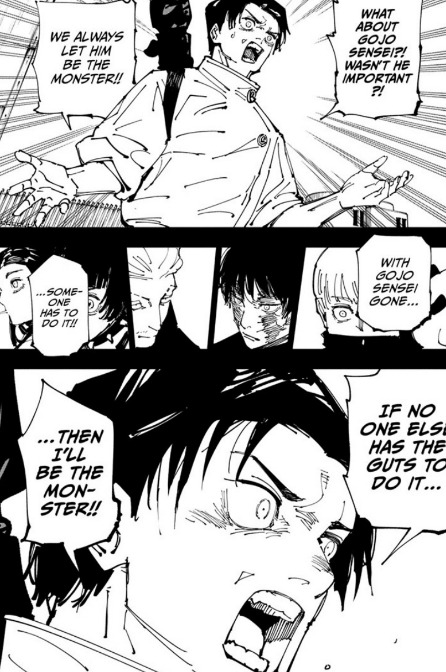
It is sad that Gojo is all alone, that he's forced to become a tool to society, but Yuta shouldn't be the one who feels responsible for that. Gojo is supposed to protect Yuta, he's the adult, the teacher, the one with power and Yuta is the child. Yuta is not the one who should be making this speech because it is not Yuta's responsibility to do any of this - but Yuta thinks it is because he owes Gojo.
However, when Gojo recruits people it's with the unspoken implication that they now owe him. He wants them to feel indebted, because then they'll be easier to use as pieces in his intended political revolution. We see this blatantly with the way he recruited Megumi.

I'll make sure you and your sister don't starve but you owe me in the form of labor later on in your life.
Gojo saved Yuta because he thought Rika was powerful and the elders were foolish for executing a potentially powerful sorcerer for THE GREATER GOOD instead of teaching him to control his power out of fear. Gojo recruited Yuji, because someone with Sukuna's power and who could eat his fingers as a vessel had the makings to be an incredibly powerful sorcerer. Gojo didn't even think of Megumi until after Geto defected, and Gojo decided he needed to start making changes to Jujutsu Society.
While Gojo's pragmatism is understandable to a point it also poisons his more nobler intentions. Since Gojo expects payment in return when he sticks his neck out for people, because these children are assets first and children secod.
I think Gojo likes Yuta. I think he gets along with him well. Yuta clearly respects him as a mentor. He did in fact go to great lengths to save Yuta from execution. He was right that it was more ethical to teach Yuta to control his powers rather than execute him for the danger he might represet. He even gives Yuta emotional advice a couple of times.
However, if Yuta was just like a grade 4 sorcerer with no special talent I doubt Gojo would have blinked at his execution. He sees Yuta for his talent first, and his potential to become someone like him. If anythig there are clear comparisons to both Megumi and Yuta. They're both prodigies born with incredible techniques, but Yuta is a lot more receptive to Gojo's grooming than Megumi is who's too traumatized to function. Gojo's not just grooming Yuta into being a powerful sorcerer, but another version of himself.
So it's almost karmic that not only does Yuta basically turn his back on everything that makes Yuta himself (his love for people, his desire to live and be surrounded by others), he also does so by literally becoming Satoru Gojo and transplanting his brain into Gojo's body.
Because Yuta is despite possessing a similiar level of talent as far from Gojo as possible. Gojo is not well liked by his comrades, he's there because he's needed due to his power. Yuta on the other hand has everyone vehemently disagreeing with his backup plan in the event of Gojo's death because they don't want to lose him.
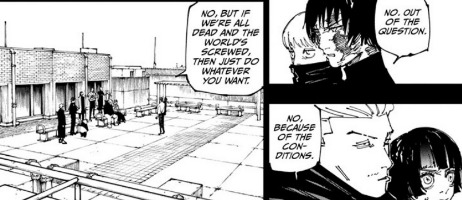
People need Gojo, they want Yuta because of the connections that Yuta has made with them and because they care about Yuta as a person. Gojo is someone who deliberately draws a line between himself and others because he believes the strongest can't be comprehended, Yuta only fights for the sake of being accepted by others because he needs their approval in order to live.
Yuta's now turned his back on those two things, his tendency to put his loved ones first, and his desire to live, both because he feels he owes Gojo.
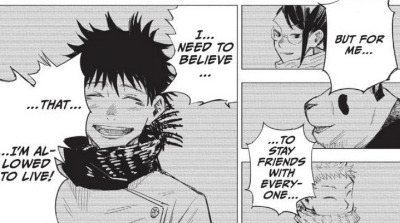
This comes about because of two factors, number one Gojo helping him with the implication that this help means that Yuta owes him something which makes Yuta desperate to pay him back and therfore easy to mold, and number two Gojo's intentions to begin with to take Yuta and make another Gojo out of him. To make a successor who would carry on the same burdens that Gojo did.
Gojo succeeded one hundred percent in making his successor as opposed to Megumi who turned out to be too different from Gojo i the end. He took what make Yuta unique and ironed out all those wrinkles until he was left with someone willing to make the same inhumane, pragmatic decisions that Gojo was.
I think it's tragic that as much as Gojo wanted to make things better for the next generation, he basically led Yuta down the same road he did, to make the same choice to throw his humanity away along with all of his loved ones. Especially since Yuta started out in such a different place.
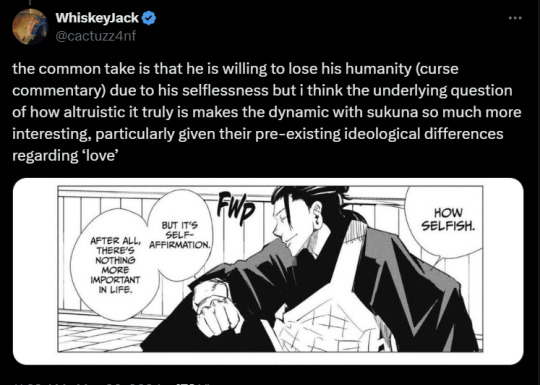
Yuta has learned to become selfish like Gojo, because selfishness is apparently now the only way to get by in this world. A cycle that has been started with the elders, and continued on with Gojo, remains unbroken as Yuta becomes just another link in the chain. Yuta's likely going to die in a stranger's body, leaving all of his friends behind to mourn him, but even if he lives what life will that be exactly?

It speaks to the arcs in Jujutsu Kaisen that they're all kind of circles at this point. We have this heartwarming goodbye of Rika telling Yuta to live, and Yuta's whole arc was to learn to try to live without Rika and make new friends, but it's now likely goig to end with Yuta dying a year after Rika finally moved on.
Choso was told to try living on as a human and Yuki even sacrificed her life to give him the opportuity to escape the fight, and he only lived a month longer to die right in front of Yuji's eyes.
Gojo put all of his hope in the next generation, but now not only did he put all the power in Gakuganji's hands but he ended up dying a year after Geto did just like Yuta will likely die a year after Rika.
I think these character arcs are turning out to be circles because the characters aren't actually doing anything to try to break the cycles that they're trapped inside of - they're only trying to get stronger. Which is why they end up resembling the actions of the villains, Yuji becoming more curselike, Yuta stealing Gojo's body the way Kenjaku did with Geto's.
It reminds me of a quote from Critical Role that I absolutely adore.
“I have just taken an audience with the Raven Queen who has snuffed any hope of my redemption, for which I am truly grateful. With new clarity, I can finally see my life as a series of compounding, poor choices.” Vax winces. “There was nothing I could’ve done to save my family, yet I still sold my soul in search of vengeance. Later I allowed Ripley to leave, knowing full well she was a greater threat to the world than the Briarwoods would ever be. I traded the world’s safety for the belief that I could murder my way to peace; that if I could be a greater horror, it would bring my family back. And once this lie was shattered I scrambled to find asolution, to make a deal, to undo my mistakes and balance the scales. I nowunderstand that there are no scales, there is no redemption, and no ledger that judges me good or evil. I am free to simply be myself and live with the terrible mistakes I’ve made."
Especially this sentence: I believed I could murder my way to peace; that if I could be a greater horror, it would bring my family back.
Maki is a character that I have not found all that interesting in a while because she committed such a huge mass murder, only for it to have no consequences in the narrative and never be mentioned again, but this chapter she suddenly became an interesting character again.
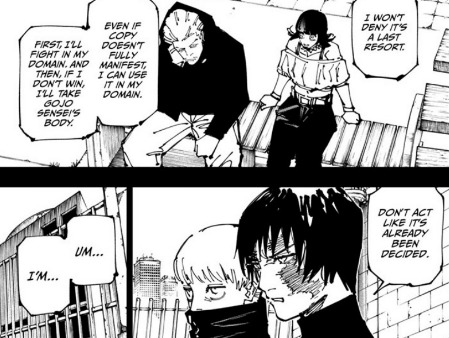
Maki who lost everything but gained strength, doesn't seem all that bothered by the loss. People compare Megumi's reaction to losing Tsumiki to Maki's reaction to losing Mai, but Megumi's reaction is much more interesting because it's always better to see a character be weak and fall apart then to be strong and power through things.
However, maybe the reason Maki hasn't experienced any grief at all towards Mai and has instead delighted in her newfound strength and independence is because of this, because she still had Yuta.
Maki is a character who's not really said anything other than exposition the past like twenty chapters, but now she's the most vocally against Yuta sacrificing himself for the greater good. Yet this is against Maki's own ideology of doing everything you can to be stronger, to win. Maki was always about individualism, not about friendship or the bonds between others, she severed her own bonds to be free. Yet, she can't stand to see Yuta do the same thing as her, to become more like her.
This might be the consequence of Maki's continued choice to value freedom and the power to achieve that freedom over all else. Now, the one time Yuta is trying to throw away the same things that she threw away she can't say anything meaningful or convince him to stop him.
Which reminds painfully of this chapter as well.
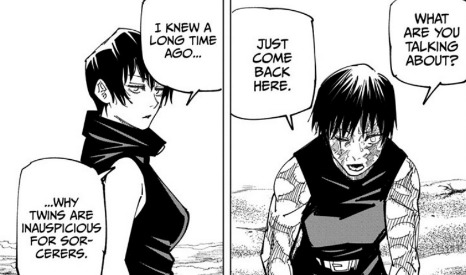
Mai killing herself in order to free Maki from cursed energy is an obvious parallel to Sukuna devouring his own twin in the womb, but the difference is in this situation Maki didn't want Mai to go, she begged her not to. However, just like with Yuta there was nothing Maki could ahve said or done by that point to convince Mai to stay. Maki has always chosen power over her sister, she's always abandoned Mai, so what exactly can she say to convince her that she cares more about Mai more? That her dream of defeating the Zen'in and having revenge against them isn't worth the price if it comes at the sacrifice of Mai?
Maki didn't want to abandon Mai, or for Mai to sacrifice herself, but tragically her every action indicated otherwise. It all comes down to this: I believed I could murder my way to peace; that if I could be a greater horror, it would bring my family back.
Maki seems to have achieved peace by murdering the Zen'in, but we see the same kind of circular arc that we have for Yuta.
Maki gave up on everything for strength, but Maki's not strong enough to finish Sukuna then and there, forcing Yuta to sacrifice himself the same way Mai did.
Maki can't talk Yuta out of making that sacrifice, or come up with any convincing argument with why he shouldn't because of all the choices she's made before this.
Maki chose to murder her way to peace, but it came at the cost of her humanity and growth and thus she's faced again with the exact same situation with Mai and she's forced to watch her heart be taken from her again.

It goes to show that we think these characters are getting stronger but they're actually sacrificing something vitally important.
These characters are just going to keep going around in circles and you have to wonder just when is it going to stop?
#yuta okkotsu#gojo satoru#jjk meta#jujutsu kaisen meta#yutamaki#jujutsu kaisen theory#jjk 261#jujutsu kaisen 261#jjk 261 spoilers#jujutsu kaisen 261 spoilers
626 notes
·
View notes
Text
On "It'll be lonely without you" in 266
Gojo says 一人は寂しいよ to Yuta, but only 寂しいよ, an expression of loneliness, is present here.


However, Yuji uses the close pronoun お前 and Gege uses katakana オマエ to emphasise it. Where else has he done that exact same thing? 😭

I believe 寂しいよ could also be interpreted as "I'll miss you" which are definitely the kind of "embarrassing words" Geto might have been referring to here. It also fits the "three words in English" criteria.

Either way, the parallels are paralleling.
#jujutsu kaisen#jjk#jjk 266#呪術廻戦#fushiguro megumi#itadori yuuji#itafushi#gojo satoru#geto suguru#satosugu#jjk spoilers#jjk manga spoilers#jujutsu kaisen spoilers#jjk meta#jjk analysis#jujutsu kaisen meta#jujutsu kaisen analysis#glo's writing#glo's analysis#fushiglow
398 notes
·
View notes
Text
Tentative thoughts about the JJK Epilogue Chapters that have just leaked.
Spoilers (obviously) under the cut:
As you know if you have come across my posts, I’m a shipper so I view things with a special satosugu lens. I mean, they’re the grandparents - the strongest of the modern era - who started the wave of change, after all.
Just this image alone reminds me of that:
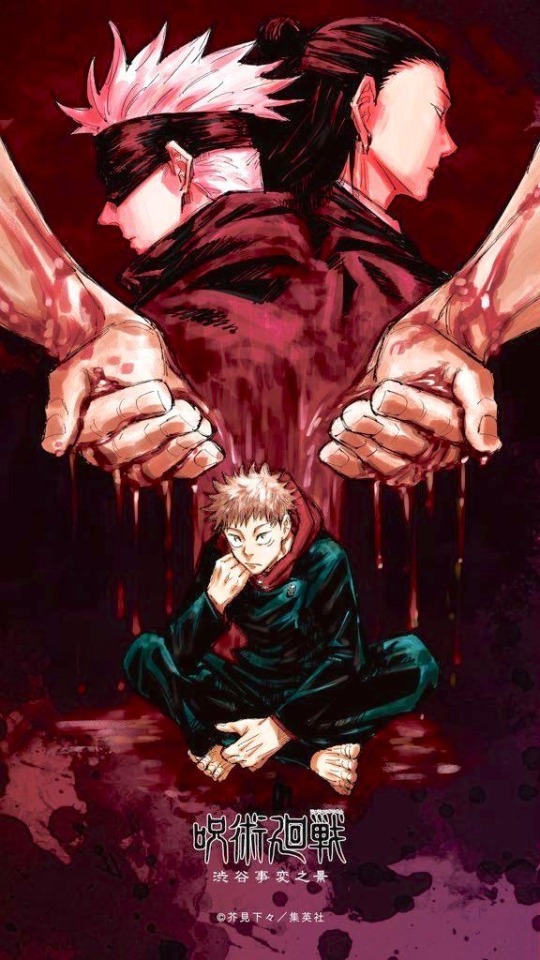
I digress.
So I think it links back to Gojo trying to nurture the students so that what happened to Geto and him wouldn’t be repeated.
The epilogue of each person seems to pull on themes relating to Gojo & Geto.
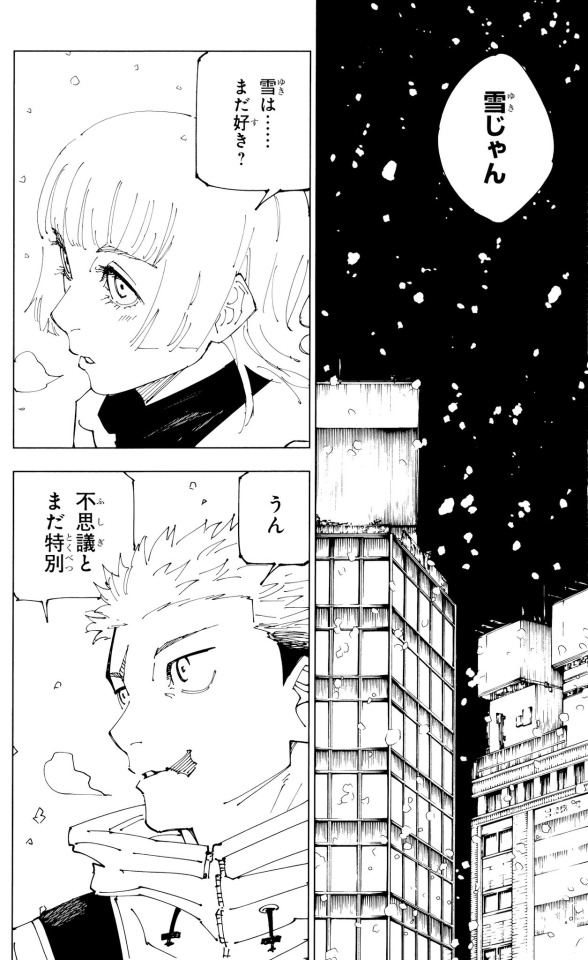
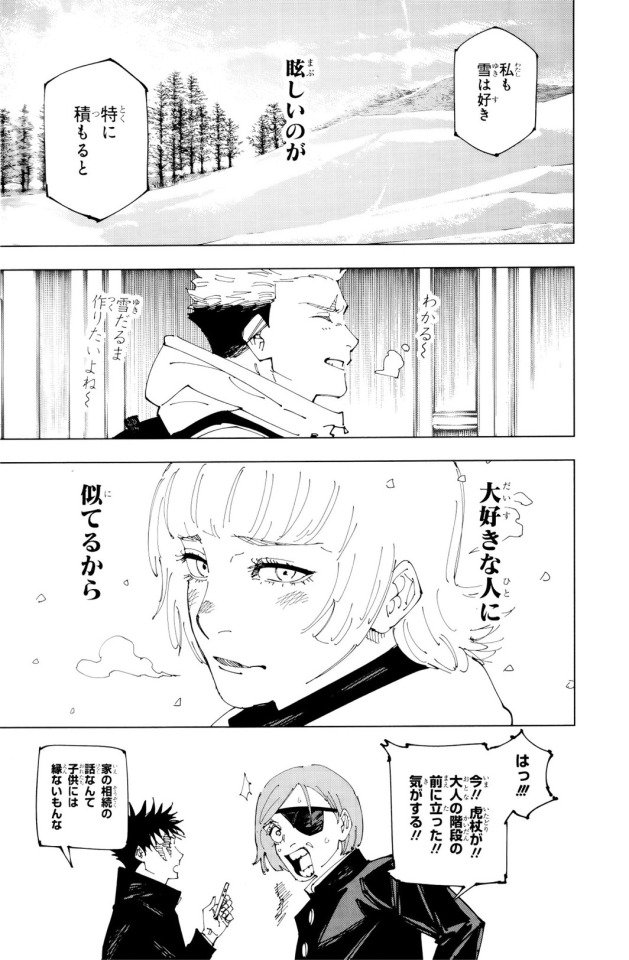
Snow = their connection = their Ao / 青春 / Blue Spring
Nostalgia. Unchanging bond. A sentimentality. Something treasured.
The person who you are on the inside may not change you when if things in life occur or threaten to change you.
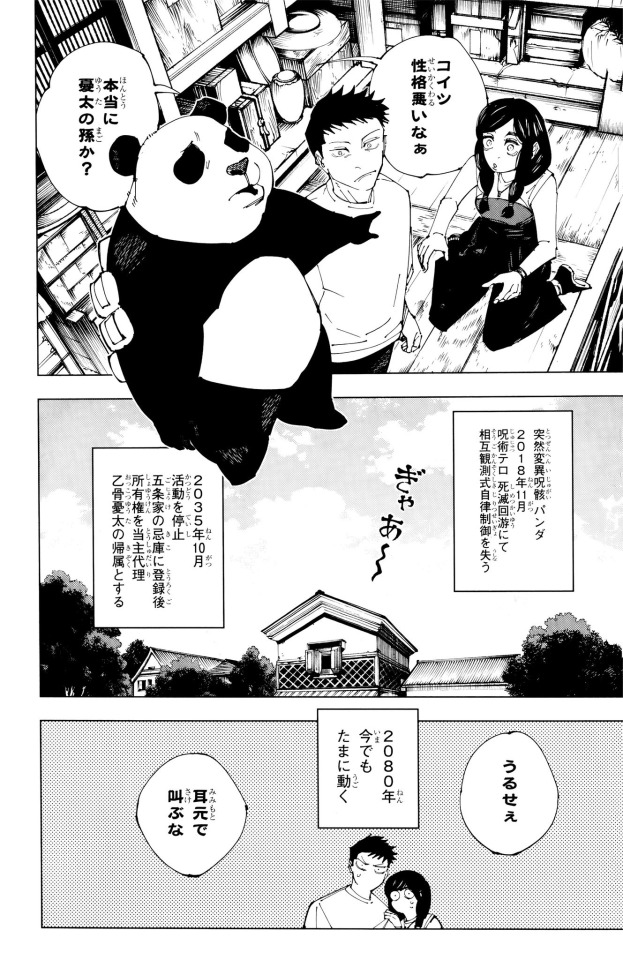
Panda being Yuta’s/Gojo clan’s treasures = being spoken about by children of the future.
The passage of time that is natural. What seems to be a peaceful world. The curse between Yuta & Rika was unlike what was between Gojo & Geto.
If one is willing to heal, people can recover & move on. EDIT: Even if I’m not generally a fan of YutaMaki , I guess I can see the sense in it. Yuta is a bit monstrous from being able to bind Rika & upon releasing use her shikigami & move on (despite(?) his pure love much as it is part of his CT) with Maki. And Maki can use Mai (with honour) to obliterate her clan to change things. So they’re just quite fitting I guess. Gojo & Geto are a little different in that they moved on in some ways, but also bound each other emotionally until the end.
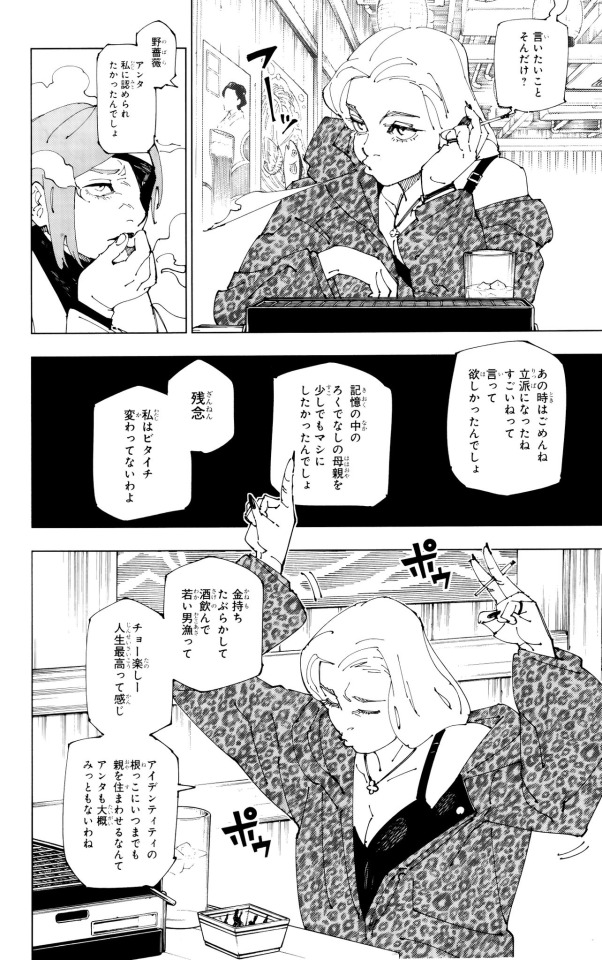
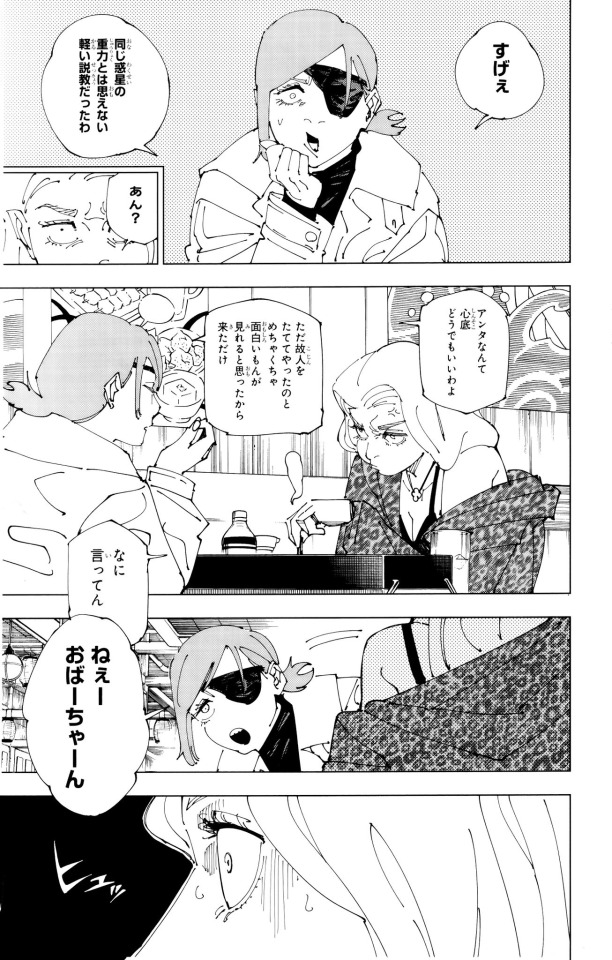
“From the bottom of my heart” / 心底 / 心の底 (as pictured from jjk0) - sincerity, authenticity. One’s true self.
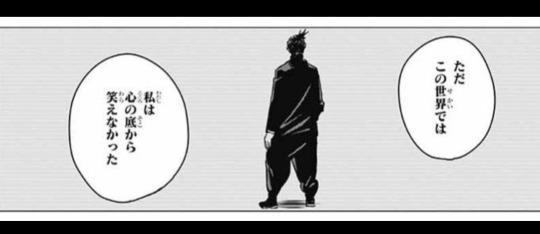
That it matters whether one truly and sincerely cares. Whether the other portrays themselves authentically or not.
Even the blindfold and Gojo’s somewhat disapproving attitude towards Geto’s apparent frivolous attitude in his portrayal as a villain was pictured in 0 — seem to parallels with Nobara & her mum.
But they’re of course not perfectly paralleled. Gojo cared for Geto & Geto was honest with Gojo at the end. Geto also never enjoyed doing what he did, unlike that Nobara’s mum appears to. But that is if we believe what she actually says.
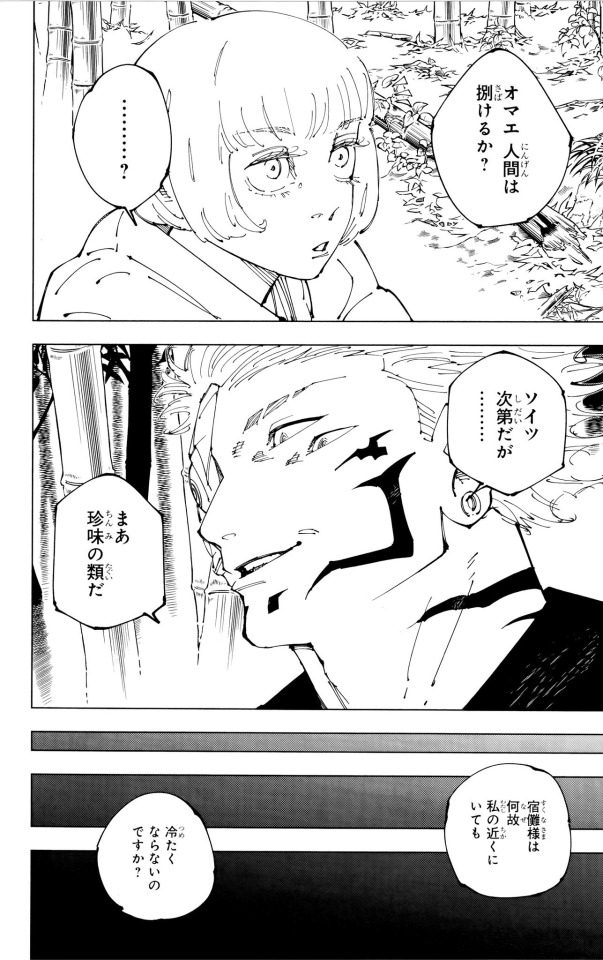
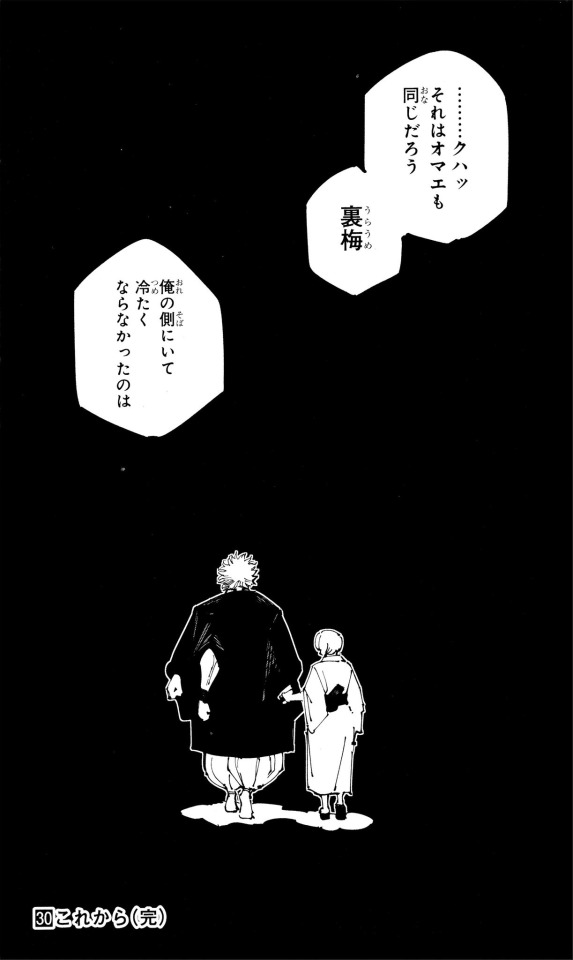
U: Aren’t you cold being beside me?
S: The same goes for you, Uraume.
Theme here? My only one.
Each other’s only exception. And they’re reunited in the afterlife.
Edit: if I’m not mistaken, Gojo & Geto do not refer to each other by name in the afterlife. Only in the scene in jjk 0 (“satoru, you’re late” & “suguru, ______”).
And so it seems poignant that Sukuna & Uraume call each other by name in the afterlife + flashback in the epilogue.
It makes for a nice contrast between the pairs, imho... it’s worth noting here that they also go in opposite directions - South & North, respectively. To the past/“unknown” and somewhere new/a “next time”.
In sum... It echoes my thoughts over the ending of jjk. Gojo, Geto, and the others of their generation helped to break the norms of the crappy jujutsu world.
Gege injects these little salient themes into the series and they’re like Easter eggs for people like me who think too much 🤣
Thank you Gege for writing this...
Thank you guys for reading my thoughts & musings.
Comments are welcome as always 🙏🏼
#jujutsu kaisen#satosugu#jjk#jjk spoilers#jujutsu kaisen spoilers#jjk epilogue#Jujutsu Kaisen epilogue#jjk 30#jjk30#jujutsu Kaisen 30#goge gego#goge#五夏#gojo satoru#geto suguru#jjk analysis#jjk meta#jjk themes#jjk parallels#jujutsu kaisen parallels#jujutsu kaisen meta#jukutsu kaisen#jujutsu kaisen analysis#stsg#jjk ending#jjk leaks#jjk satosugu#satosugu analysis#jjk stsg#jjk theories
72 notes
·
View notes
Text
I'll keep this short and sweet. Not a headcanon... this is factual analysis, because that's what I do.
Nanami Kento is Autistic. Send.
#i can gladly explain in more detail if people want it. jist#fictionalmenmistress#godbless#original post#nanami kento#nanami x reader#jjk nanami#jujutsu nanami#nanami smut#kento nanami#jjk kento#kento smut#jujutsu kaisen#jujutsu kaisen meta#jjk meta#jjk#jjk analysis#autism#actually autistic#autistic adult#autistic nanami#jjk headcanons#jjk hcs#jujutsu kaisen headcanons
50 notes
·
View notes